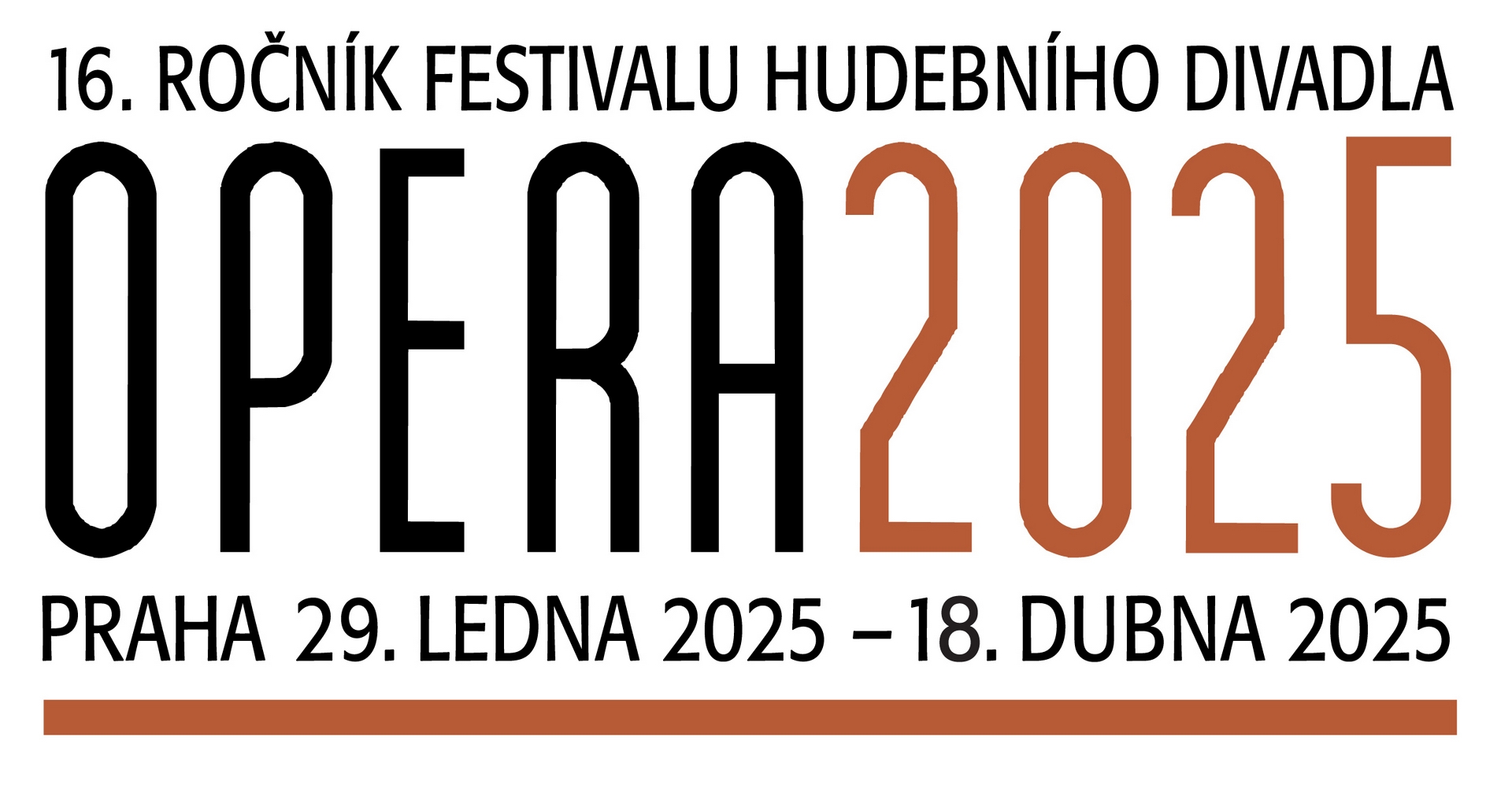
Wednesday,
January 29, 2025, 7 p. m., Estates Theatre
SILESIAN THEATRE OPAVA
Leoš Janáček: KÁŤA KABANOVÁ (KATIA KABANOWA)
Conductor: Marek Prášil
Stage Director: Jana Andělová Pletichová
Sets: Jaroslav Milfajt
Costumes: Michaela Savovová
Chorus Master: Kremena Pešakova
Kabanicha – Katarína Jorda
Káťa – Tereza Kavecká
Dikoj – David Szendiuch
Boris – Juraj Nociar
Tichon – Jakub Rousek
Kudrjaš – Vít Šantora
Varvara – Anna Moriová
Kuligin – Zdeněk Kapl
Glaša – Lenka Jakubcová
Fekluša – Andrea Plachká
Woman – Lenka Liberdová
Man – Zdeněk
Krajíček
Silesian
Theatre Orchestra, Chorus and Ballet
Love and hatred, the
weight of convention and the tempting forbidden fruit... The emotional story of
Katya, who is emotionally languishing in a troubled marriage and succumbs to
her passion for the young Boris, but under the weight of remorse confesses her
transgression. Her mother-in-law, the domineering Kabanicha, would prefer to
bury her alive. Desperate Katya ends her unfulfilled life in the Volga River...
Premiere:
April 28, 2024
Approximate
running time 2 hours 15 minutes, 2 intermissions
In Czech original with Czech subtitles
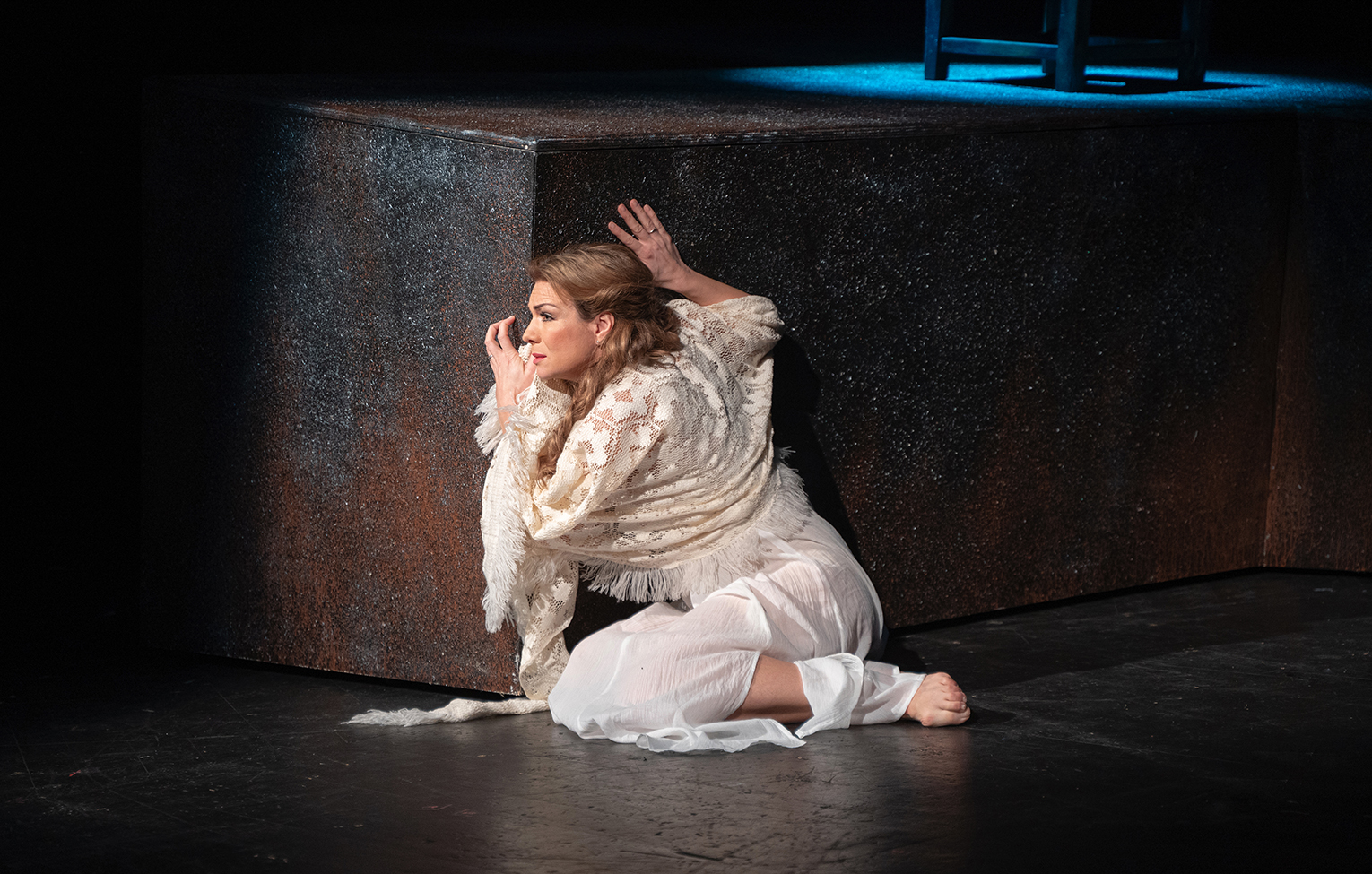
Photo Lukáš Wodeck
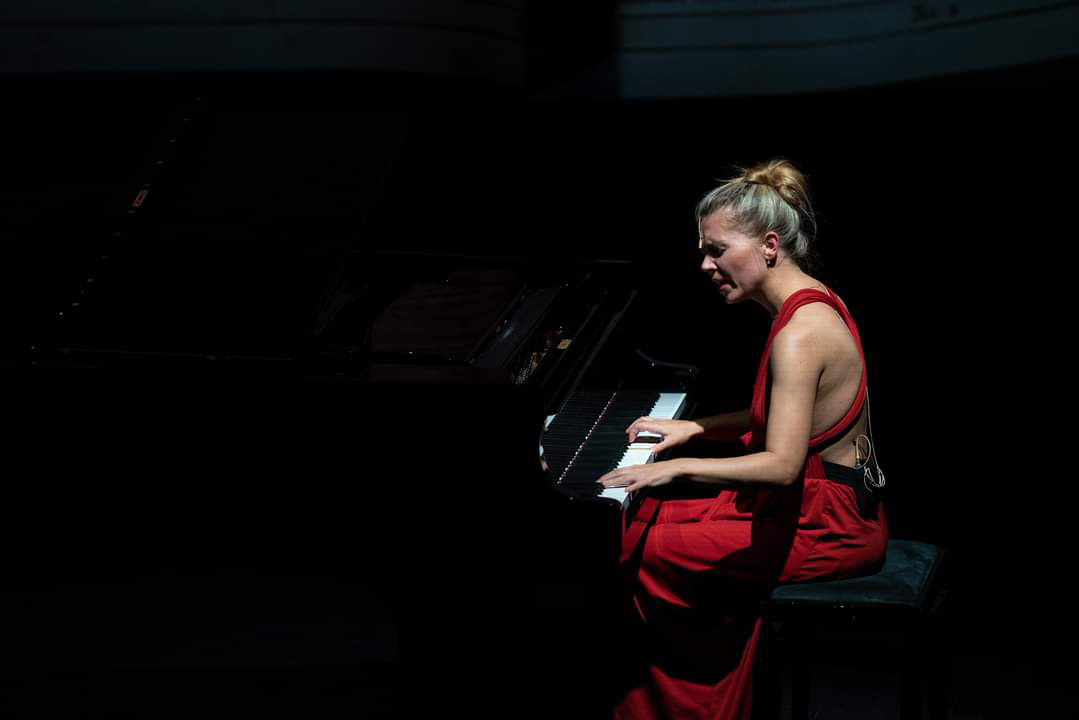
Saturday, February 1, 7:30 p. m., La Fabrika
(Komunardů
1001, Praha 7 – Holešovice)
Sára
Medková, Ivo Medek, Vít Zouhar: SÁRA´SMILE
Stage Director: Rocc
Video: Lukáš Medek
Starring:
Sára Medková – piano, vocals
Ivo Medek – children's toys, percussion
Vít Zouhar – laptop
A new multimedia opera created by the artistic team
of Sára Medková, Ivo Medek, and Vít Zouhar, with video by Lukáš Medek and
directed by Rocc, offers a personal narrative interwoven with moments of
laughter and echoes of forgotten music.
We are constantly
expanding our perception of reality, both virtually and tangibly. It evolves as
we see it differently, live through it, describe it, reflect on it, and
interpret it. We live through myths, live within them, and turn our lived
experiences into myths. Every day, we fight intense battles, and every day, we
either triumph or falter, always pushing ourselves beyond our limits. The line
between reality and imagination blurs, as does the distinction between what is
obvious, trivial, or monumental.
We shape reality into
myth because the ordinary often feels too static, too lacking in drama or
grandeur. The mundane overwhelms us, while the extraordinary can seem trivial.
Everything depends on perspective, and every perspective holds power—the power
to shift how we see and understand.
Sara's smile symbolizes
the layering of parallels: lives, destinies, perspectives, and stories. They
are fragments of peaks in the landscapes of daily life and mythical tales,
pieces of rituals and suggestions of receptions. Fleeting reflections of
countless Saras dissolve into an infinite loop, lost in the mirrors' endless
reflections. We cannot say how many exist—past, present, or future. All we know
is that myth shapes reality, and reality holds the essence of myth. And as we
try to grasp it, it slips through our fingers like a fleeting nymph.
Premiere:
October 25, 2022, Orlí Theatre in Brno, as part of the Exposition of New Music Festival
Approximate
running time ca. 60 minutes, no intermission
In Czech
original
Photo Jakub Joch
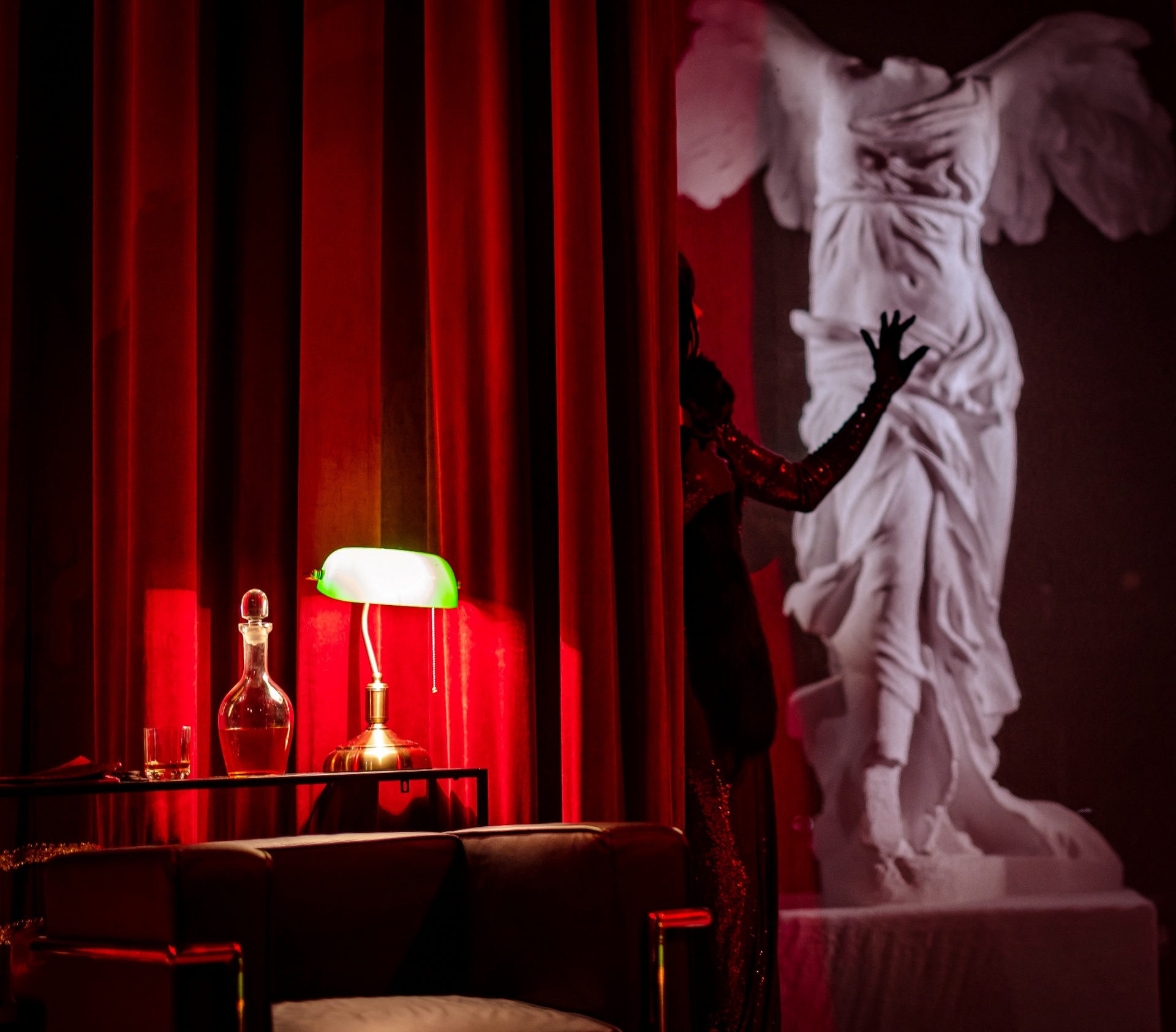
Tuesday, February 4, 2025, 7 p. m., Estates Theatre
NATIONAL
THEATRE KOŠICE
Karol
Szymanowski: KRÓL ROGER (KING ROGER)
Conductor: Peter Valentovič
Concept: Anton Korenči, Roland Khern Tóth,
Stanislav Trnovský
Stage Director: Anton Korenči
Sets: Ondrej Zachar
Costumes: Boris Hanečka
Light Design: Róbert Farkaš
Chorus Master: Peter Valentovič
Roger II, King of Sicily – Michał Partyka
Roxana, his wife – Gabriela Hrženjak
Edrisi, an Arab scholar – Maksym Kutsenko
Shepherd – Andrzej
Lampert
Archbishop – Michal Onufer
Deaconess – Myroslava Havryliuk
Young boy – Oleksandr Tishchenko
National Theatre Košice
chorus and orchestra, children's choir under the direction of Igor Dohovič
The opera,
King Roger, is the supreme work of Karol Szymanowski, whose creation was
finished between 1918–1924. The libretto was written by the
composer in collaboration with his distant cousin Jaroslaw Iwaskiewicz, who
later became a well-known Polish writer. After several visits to Italy and
Sicily, Szymanowski was fascinated by their culture and history, as well as the
unknown worlds that opened up to him in Mediterranean surroundings. The
Bacchae by Euripides, Plato's Phaedrus and Symposium, as well as the works of
Friedrich Nietzsche also became King Roger´s spiritual inspiration.
The opera
offers the story of the ruler Roger as a representative of a social system, a
world of rationality, discipline and faith, disrupted by a mysterious Shepherd.
With the arrival of a modern prophet, who preaches hedonism and self-indulgence
and is followed by crowds, not only will the existing social order be shaken,
but Roger´s personal transformation will also begin. Szymanowski himself
referred to his work as a “mystery”– his themes are self-knowledge, sexuality,
altered states of consciousness, but also religion and new forms of
spirituality.
This
original synthesis of musical and spiritual-philosophical influences in King
Roger is one of the reasons why this piece has become closer to the modern
audience in recent years and is experiencing its renaissance on the biggest
opera stages of the world.
Premiere:
November 23., 2022, in Košice
Approximate
running time 80 minutes, no intermission
In Polish
original, with Czech and English subtitles
Suitable for ages 15 and
older
Lighting and sound effects are used in the
production.
Photo Joseph Marčinský
Thursday, February 6, 2025, 7:30 p. m., Vzlet (Holandská 669/1, 101 00 Praha 10 – Vršovice)
VZLET,
VOSTO5, MORAVIAN THEATRE OLOMOUC, RUN OPERUN
Ivan
Acher, Martin Konvička, Jiří Havelka, Marta Ljubková, Veronika Loulová:
ZABIJAČKA (PIG SLAUGHTER)
Stage Director: Jiří Havelka a Veronika
Loulová
Conductor: Petr Šumník
Sets and Costumes: Dragan Stojčevski
Dramaturgy: Marta Ljubková
Choreography: Veronika Knytlová
Light Design: Štěpán Hejzlar
Sound: Michal Brůna
Video: Martin Bražina
Music Conductor: Martin Konvička
Producers: Petr Prokop, Jakub Málek
Production: Denisa Sedláčková,
Martina Watzková, Adriána Spišáková, Emílie Formanová
Cast:
Butcher – Vladimír Chmelo
Mayor – David Szendiuch
Priest – Peter Malý
Teacher – Vanda Šípová
Housekeeper – Tereza Papoušková
Herbalist – Zoja Oubramová
Village men and women: Josef Bobeš Havelka, Leontýna Janků, Marie Anna
Krušinová, Robert Nižník, Antonie Rašilovová, Pavol Smolárik, Matěj Šíma, Sára
Vosobová and Mifun child choir headed by Jiří Polívka
Organising Committee of the Festivities: David Dvořák, Tomáš Jeřábek, Ondřej Bauer
and Petr Prokop
Moravian Theatre Olomouc
Orchestra
A comedic opera in three
acts and two courses, portraying a ritual spring celebration as an opportunity
to look into one's own guts.
Snow is slowly falling
on the village. It's cold. And hunger is cruel. Fortunately, a long-awaited
event is around the corner to save everyone. The butcher's coming, there's
going to be a slaughter! As the old folk wisdom goes, "who's hungry is
always sad, stuff your tummy, don't be bad". A piece of slop is the remedy
for every existential crisis. The butcher arrives as a bringer of goodwill and
redemption, welcomed by a Czech village filled with colorful, quirky
characters.
The original opera draws
inspiration from the Smetana-Lada tradition, but it comes at a time when most
of the country side's pigs have been long gone. Our contribution to Czech art
in Lent means a lavish artistic feast with unadulterated operatic singing,
dance numbers, and even a children's choir!
In Czech
original
Premiere:
March 1, 2023
Approximate
running time 70 minutes, no intermission
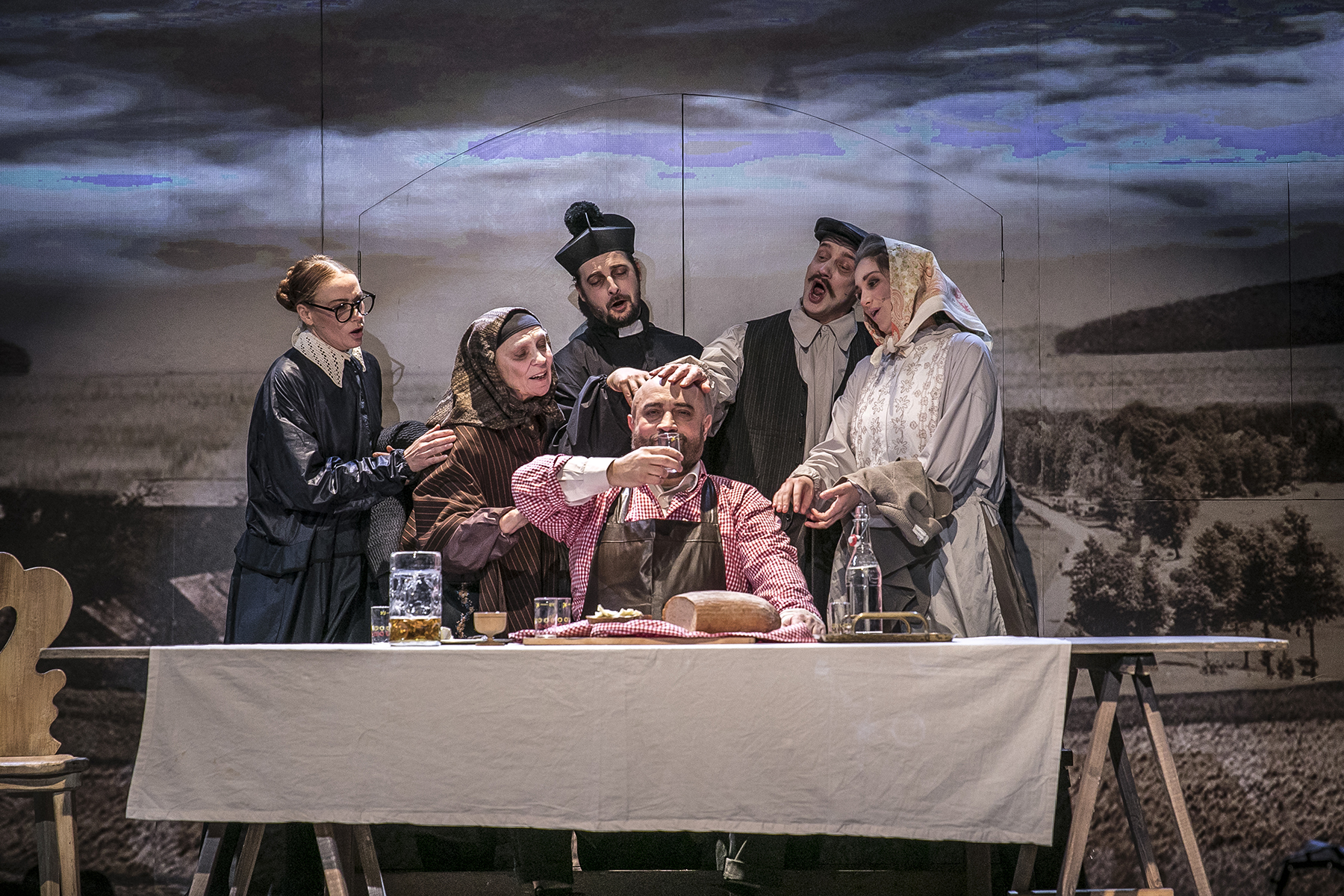
Photo Jan Mudra
Friday, February 7, 2025, 5 p. m.,
Estates Theatre
STATE OPERA, BANSKÁ BYSTRICA
Rachel
Portman: The Little Prince
Conductor: Igor Bulla
Stage director: Dana Dinková
Sets: Lucia Šedivá
Costumes: Ľudmila Várossová
Light design: Marek Červienka
Chorus master: Daniel Simandl
Choreography: Dana Dinková
Dramaturgy: Alžbeta Lukáčová
The Little Prince – Leonard Bíró
The Pilot – Martin Popovič
The Fox – Katarína Procházková
The Snake – Dušan Šimo
The Water – Patrícia Malovec
The Rose – Michaela Kušteková
Businessman – Šimon Svitok
The King – Ivan Zvarík
Drunkard – Zoltán Vongrey
Vain Man – Peter Račko
Lamplighter – Andrej Vancel
This musical-dramatic piece for children, called a "magical
opera," is a musical rendition of one of the most beloved fairy tales in
modern literature—Antoine de Saint-Exupéry's timeless 1943 classic. The music
is composed by Rachel Portman, an acclaimed composer known primarily for her
work in film scores.
The story follows a pilot, who is also a writer, stranded in the Sahara
Desert during the war after his plane crashes. There, he meets the Little
Prince, a boy who has traveled from a distant asteroid. Through their
conversations, they explore deep themes like the meaning of life, friendship,
love, pride, and humility. The work is filled with rich metaphors and symbolism
that can captivate the hearts of children and offer adults thought-provoking
parables.
State opera
chorus, orchestra and ballet, together with The Banská Bystrica Children's Choir at Art School of Ján
Cikker
Premiere: May 27, in Banská
Bystrica
Approximate
running time 120 minutes, 1 intermission
In Slovak original, with Czech
and English subtitles
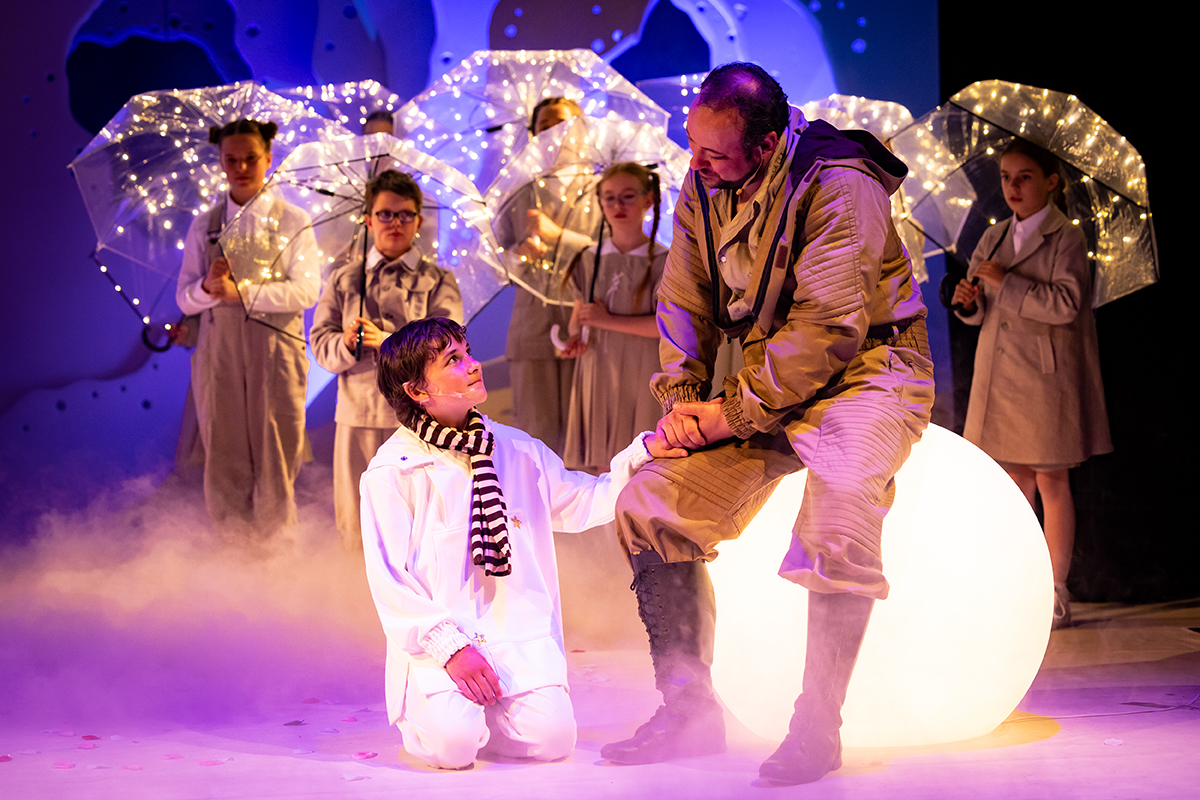
Photo Zdenko Hanout
Monday, February 10., 2025, 7 p. m.,
State Opera
SOUTH BOHEMIAN THEATRE,
ČESKÉ BUDĚJOVICE
Jan
Jirásek: KOMENSKÝ (COMENIUS)
Libretto: Tomáš Jarkovský
Conductor: Jiří Štrunc
Stage director: Tomáš Ondřej Pilař
Sets: Marek Kubát, Tomáš Ondřej Pilař
Costumes: Dana Haklová
Light design: Daniel Tesař
Choreography: Martin Šinták
Chorus master: Martin Veselý
Dramaturgy: Eva Marečková, Marek Pavlíček
Jan Amos Sr. – Jan Šťáva
Jan Amos Jr. – Jakub Hliněnský
Magdalene – Anna Moriová
Ubiquitous – Michal Marhold
Delusion – Zuzana Koś Kopřivová
Daniel, son of Comenius – František Sliž
Mayor / Ferdinand II. – Tomáš Kořínek
Doctor Tulp – Tomáš Maliniak
Two townsmen – Martin Doucha, Přemysl Stibor
Two townswomen – Tereza
Faltýnová, Kristýna Janů
South
Bohemian Theatre orchestra, chorus and ballet
A
brand-new opera composed by Jan Jirásek, holder of two Czech Lions.
Commissioned by the South Bohemian Theatre, this new piece will take you
through the turbulent Europe of the 17th century at film speed. It is a story about
how to find paradise of the heart in the labyrinth of the Thirty Years’ War,
plagues, religious intolerance, personal tragedies, and life in exile. .
Jan Amos Komenský stands
as one of the most significant European thinkers in modern history. His ideas
were so forward-thinking that they remain influential even today, particularly
in education, where many of his principles still guide our approaches.
Komenský's life was marked by great hardship, not only because he lived through
the devastation of the Thirty Years' War—the largest European conflict of its
time—but also because he experienced other wars and endured multiple plague
epidemics. These outbreaks claimed the lives of his parents and sisters in
Uherský Brod, as well as his wife and children in Fulnek, along with many
friends and acquaintances in Lešno.
In our collective
memory, Jan Amos Komenský is widely known as the "teacher of
nations." This title is well-deserved, as his educational works opened
doors to the broader world. He worked in various countries, including Sweden
and England, where he was even considered for the position of rector at Harvard
University. He also settled in Leszno, Poland, before being expelled for
collaborating with the Swedes, who had previously laid siege to the town.
Komenský spent his final 14 years in Amsterdam and was laid to rest in the
nearby village of Naarden. Although he passed away believing that most of his
works had been destroyed and that little of his legacy remained, around 250 of
his works have survived. In addition to his educational texts, such as Orbis Pictus and The Gate of Languages Opened, he also authored philosophical and
allegorical works. One of the most renowned is The Labyrinth of the World and the Paradise of the Heart, which was
published exactly 400 years before the premiere of the opera Comenius. Two characters from this
opera, Searchall Ubiquitous and Delusion, are taken from this book, and the
artist has symbolically dressed them in costumes adorned with illustrations
from Komenský's work.
The world
premiere: December 6, 2023, České Budějovice
Approximate running time 2 hours, one intermission (30 minutes)
In Czech original, with German
subtitles
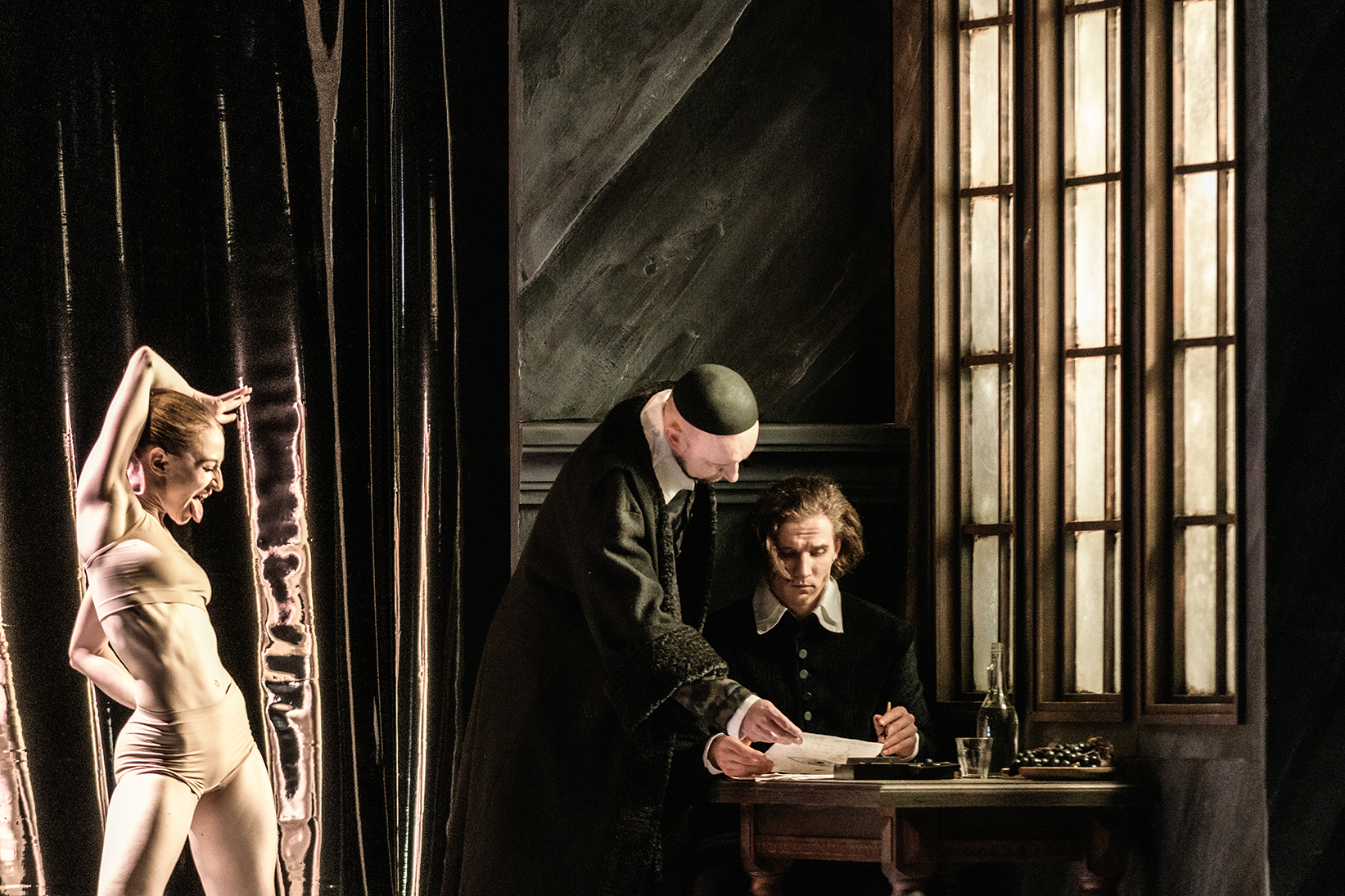
Photo Martina Root
Thursday, February 13, 2025, 7 p. m.,
Estates Theatre
J. K. TYL
THEATRE (PLZEŇ)
Wolfgang
Amadeus Mozart: La clemenza di Tito
Music preparation: Michael Hofstetter
Conductor: Jiří Petrdlík
Stage director: Rocc
Sets: Rocc
Costumes: Belinda Radulović
Light design: Kai Fischer, Jakub Sloup
Dramaturgy: Vojtěch Frank
Chorus master: Jakub Zícha
Titus – Marek Žihla
Sextus – Markéta Cukrová
Annius – Barbora de Nunes-Cambraia
Vitellia – Barbora Perná
Servilia – Zuzana Koś Kopřivová
Publius – Jakub Hliněnský
J. K. Tyl
Theatre orchestra and chorus
“Meine Prager verstehen mich” (My Praguers understand me). This is perhaps Mozart’s most well-known expression of his deep
fondness for the Czech lands and their people. In their honor, he composed his
magnificent opera about the Roman Emperor Titus for the coronation of Leopold
II. The opera debuted on 6 September 1791 at the Estates Theatre in Prague. To
this day, it continues to be performed worldwide, celebrated for its brilliant
music that often outshines the somewhat formulaic plot set in Rome in 79 AD.
Premiere:
January 27, 2024, in Pilsen
Approximate
running time 140 minutes, one intermission
In Italian
original, with Czech and German subtitles
The production is
recommended for ages 12 and older
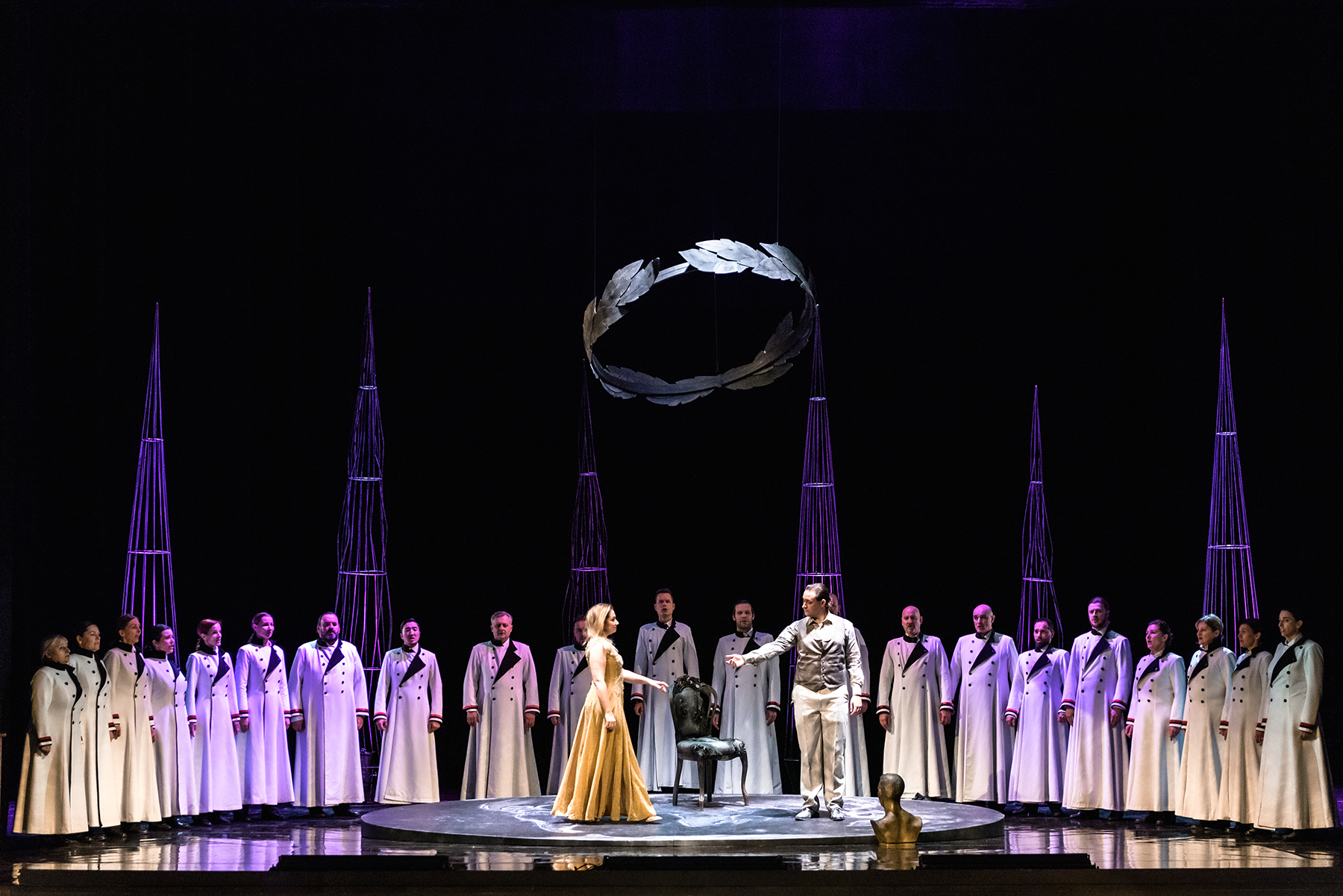
Photo Martina Root
Saturday, February 15, 2025, 4:30
p. m., Spejbl and Hurvínek Theatre (Dejvická
38, Praha 6)
SPEJBL AND
HURVÍNEK THEATRE, NATIONAL THEATRE BRNO
Patricie
Částková, Bedřich Smetana: HURVÍNEK BARTERS THE BRIDE
Music preparation: Ondrej Olos
Stage director: Hana Mikolášková
Sets and Costumes: David Janošek
Dramaturgy: Patricie Částková
Spejbl – Martin Trecha
Hurvínek – Martin Trecha, David
Janošek
Mánička – Jana Mundráková
Žeryk – Jan Levý
Jeník /
Vašek – Tomáš Kořínek
Mařenka – Jana Šrejma Kačírková
Kecal – Daniel Nykl
Esmeralda /
Innkeeper – Eva Esterková
Ringmaster – David Janošek
Inspector – Ilona Š. Hájková
Daddy, how do you barter a bride?
How did you come up with that someone would barter a bride, Hurvínek? Well, it
says here: The National Theatre Brno presents Bedřich Smetana’s opera The
Bartered Bride. So how is it, Daddy? Well, you know, it’s just pretending… how
would I… it’s kind of a ploy to buy a bride for yourself. Now I’m confused – is
she sold or bought? You know what, Hurvajz, take Žeryk and Mánička and let’s go
to the opera, it’ll be easier than explaining it to you!
Would you
also like to know what the deal is with selling the bride? Smetana’s The Bartered Bride is one of the
iconic opera pieces, but we decided to bring it closer to children this time.
And because a comic opera should be really fun, the members of the ensemble of
the Janáček Opera of the National Theatre Brno have invited the best possible
guides. In the new family show, the famous puppet characters Spejbl, Hurvínek
and Mánička will take you through The
Bartered Bride and the world of opera. You will also see Žeryk and
hear the best musical pieces as well, because the beloved puppets will
be assisted by opera soloists together with our special Smetana mini-orchestra.
Premiere:
November 24, 2023, at the Reduta Theatre, Brno
In the Czech
original
Approximate
running time 1 hour 45 minutes, no intermission
Family opera
entertainment for children aged 5 to 100.
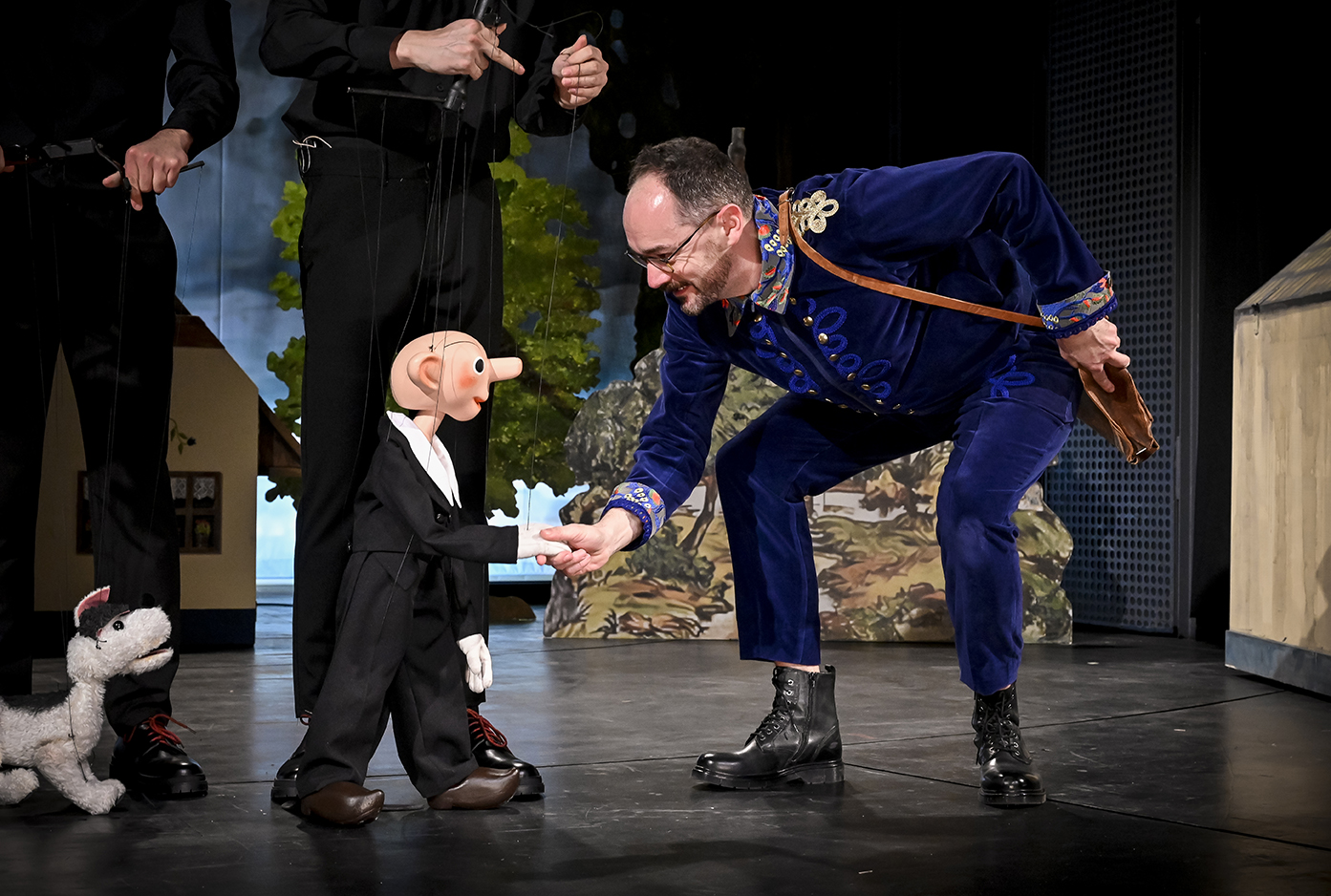
Photo Marek Olbrzymek
Tuesday, February 18, 2025, 7 p. m.,
Estates Theatre
F. X. ŠALDA
THEATRE LIBEREC
Josef
Mysliveček: ADAM A EVA
Conductor: Paolo Gatto
Stage director: Linda Hejlová Keprtová
Sets: Michal Syrový
Costumes: Tomáš Kypta
Chorus master: Tadeáš Tulach
Dramaturgy: Lenka Dandová
Choreography: Marika Mikanová
Adam – Krystian Adam
Eva – Jolana Slavíková
Angelo di Giustizia – Veronika Kaiserová
Angelo di Misericordia – Věra Poláchová
Relatives – Johana Březinová, Anya Beth Clarke, Jana
Černá, Jaroslav Kolář, Michal Kováč, Lucy Grace Macphail, Kristýna Petrášková,
Richard Svoboda, František Šourek, Alexey Yurakov
F. X. Šalda
Theatre chorus and orchestra
"Full of fire, spirit, and life" is how Wolfgang Amadeus Mozart described Josef
Mysliveček's oratorio Adam and Eve.
Such high praise was rare from the notoriously critical Mozart, making this an
exceptional compliment. He recognized the oratorio's exceptional quality,
praising Mysliveček's melodic creativity and the clarity and elegance of his
musical expression. The piece was first performed in Florence in 1771. Czech
audiences have not yet had the chance to experience the oratorio live, but the
DFXŠ opera company recently brought the work to the stage for the first time in
Czechia.
Premiere:
September 22, 2023, in Liberec
In Italian
original, with Czech and German subtitles
Approximate
running time 125 minutes, one intermission
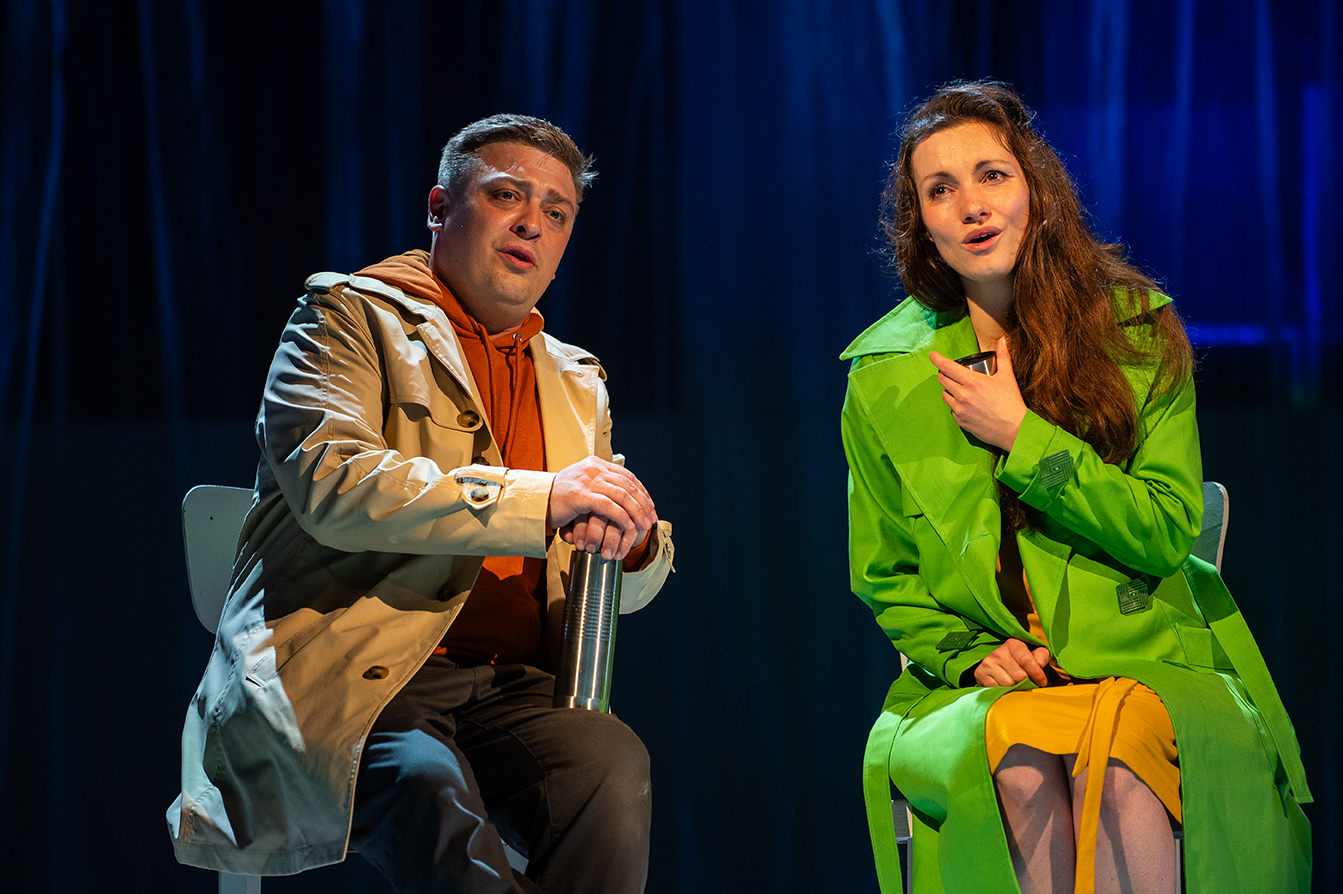
Photo Daniel Dančevský
Thursday, February 20, 2025, 7 p. m., Na Marjánce
(Bělohorská
262, Praha 6)
STUDIO VOLANTES
František
Škroup: DRÁTENÍK (TINKER) CANCEL
Music preparation: Marek Čermák
Stage director: Kateřina Křivánková
Sets and costumes: Sylva Marková
Tinker / Škroup – Matúš Šimko
Růženka – Lenka Cafourková Ďuricová
Vojtěch – Vincenc Ignác Novotný
Liduška – Zuzana Badárová
Květenský – Aleš Janiga
Lána – Jiří Miroslav Procházka
Kůl – Martin Vodrážka
Hranatý / Chmelenský – Martin Mihál
Volantes
Orchestra, artistic director Marek Čermák
Love cannot be broken. Růžena and Vojtěch fall in love at first sight,
but their fathers have different plans for their futures.
The Tinker is a comic opera in two acts, with a libretto
by Czech poet and translator Josef Krasoslav Chmelenský (1800–1839). It
premiered on 2 February 1826 at the Estates Theatre in Prague. Under Škroup's
urging, Chmelenský quickly wrote the libretto and handed it over to Škroup to
compose the music. Škroup finished the score, which was influenced by the style
of Viennese singspiel and French opéra-comique, by the end of 1825. As he saw
this work as his first significant composition, he assigned it opus number 1.
Škroup also took charge of the production and performed the lead tenor role
himself. The premiere of the first original Czech opera was a significant
cultural event, attended by key figures from Czech artistic and intellectual
circles.
In Czech
original
Approximate
running time 120 minutes, one intermission
Premiere:
August 18, 2022, as part of the Olomouc Baroque Festival
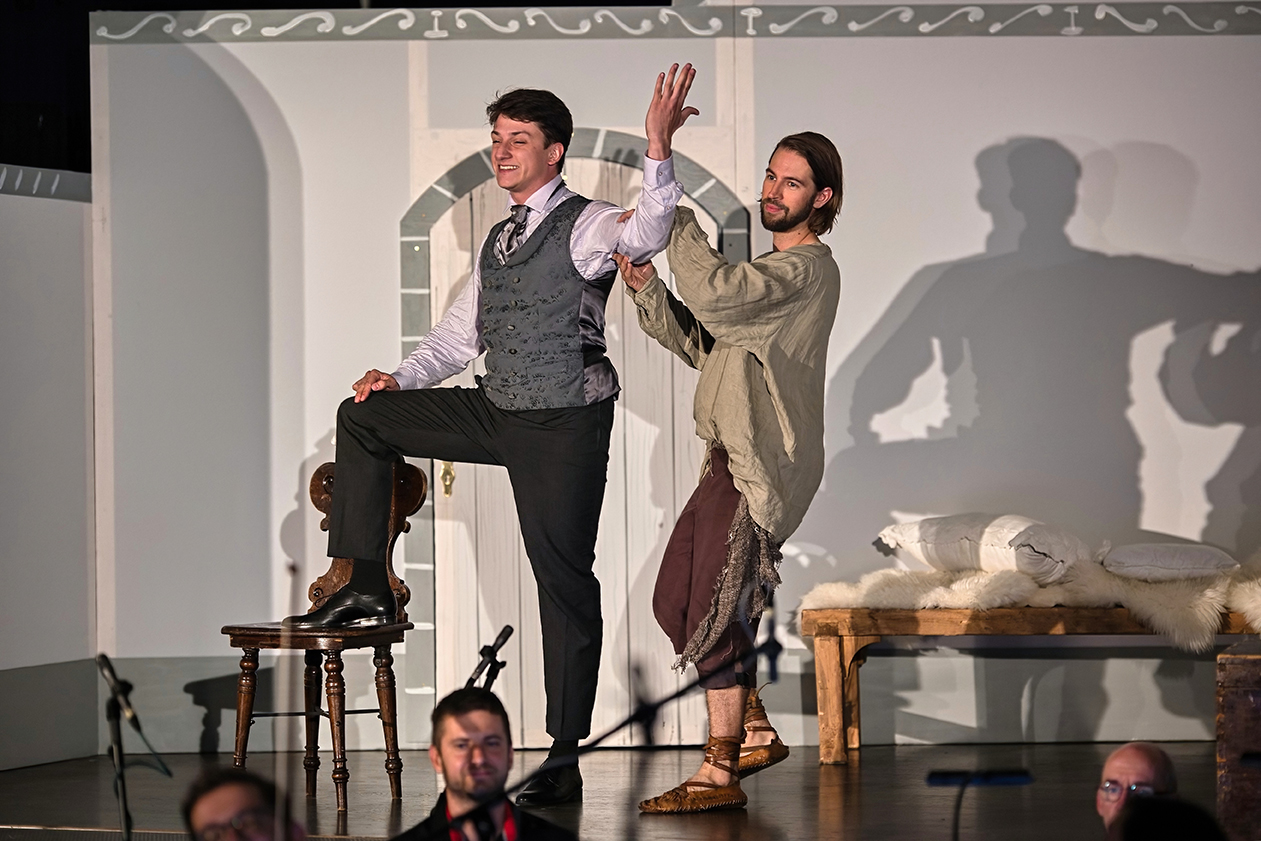
Photo Panda Foto pro Olomoucké barokní slavnosti
Saturday, February 22, 2025, 7 p.
m., Estates Theatre
NATIONAL
THEATRE
Luigi Cherubini: MÉDÉE
Conductor: Robert Jindra / David Švec
Stage director: Roland Schwab
Sets: Paul Zoller
Costumes: Sabine Blickenstorfer
Light
Design: Franck Evin
Chorus master: Lukáš Kozubík / Pavel Vaněk
Dramaturgy: Lenka Dandová
Choreography: Ondřej Hučín
Médea: Svetlana Aksenova
Giasone: Evan LeRoy Johnson
Creonte: Marcell Bakonyi
Glauce: Jana Sibera
Neris: Arnheiður Eiríksdóttir
1st Maid: Magdaléna
Hebousse
2nd Maid: Alžběta
Vomáčková
Commander of the Royal Guard: Martin Potoma
National
Theatre Chorus, National Theatre Orchestra, National Theatre Opera Ballet
Medea has fascinated
numerous artists, from Antiquity to modern times – from Euripides through
Seneca, Pierre Corneille, Franz Grillparzer, Jean Anouilh, Pier Paolo Pasolini
and Heiner Müller, to contemporary creators. There is a number of operas
based on this extremely dramatic, grisly and, notwithstanding (or owing
precisely to) its brutality, highly human story. Medea sacrifices everything
for her beloved Jason and saves his life on multiple occasions – and she only
wants one thing in return: constant love. Yet Jason’s craving for power is
stronger than his desire for Medea, hence after ten years of marriage he
intends to abandon her to wed another woman, who will finally make his dream
come true. Deeply hurt, the betrayed Medea decides to take revenge, not
hesitating to dispense with that which mothers regard as the most sacred – the
lives of her own children … One of those who set the final, most
heart-wrenching part of the long Medea story was Luigi Cherubini,
an Italian composer who spent most of his career in France.
Although written to
a French libretto in Paris, Médée clearly reveals his
having been inspired by Italian music, thus being a direct precursor of
Rossini’s, Donizetti’s and Bellini’s operas. The Italian, early 20th-century,
version of Médée, to be staged at the Estates Theatre, was
primarily made famous in the 1950s and 1960s by the divine soprano Maria
Callas, for whom Medea was an iconic role.
In Italian,
surtitles in Czech, English
Premiere: January
23, 2025

Saturday, March 8, 2025, 7:30 p.
m., La Fabrika (Komunardů 1001, Praha 7 – Holešovice)
ENSEMBLE OPERA DIVERSA
Ondřej
Kyas: DRUHÉ MĚSTO (THE OTHER CITY)
Music, libretto: Ondřej Kyas
Conductor: Gabriela Tardonová
Stage director: Kateřina Křivánková
Sets and costumes: Sylva Marková
Video: Tomáš Hrůza
Light design: Anna Laborová
Production: Magdalena Dostálová, Jiří Čevela,
Sylva Marková
Starring:
Jana Vondrů
Aneta
Podracká Bendová
Alžběta
Symerská
Michael
Robotka
Tomáš
Chloupek
Aleš Janiga
Pavel Slivka
Libor Skokan
Lukáš Riegel
in the spoken role of Narrator
Ensemble
Opera Diversa Orchestra, artistic director Jan Bělohlávek
Opera in two acts based
on the novel of the same name by Michal Ajvaz
A strange book from a
Prague antiquarian bookstore, written in an unknown handwriting, keeps the main
character awake – bit by bit he uncovers the hidden secrets of the Other City
and tries to understand its meaning. The longer he unravels its clues, the more
the mysterious city absorbs him. What lies at the heart of the city? Will he
survive the battle with the shark on the church tower? Can a man and a woman
reach their dream beach? Will the green tram arrive?
The world
premiere: December 16, 2023, in CO.LABS, Brno
Approximate
running time 130 minutes, one intermission
In Czech
original
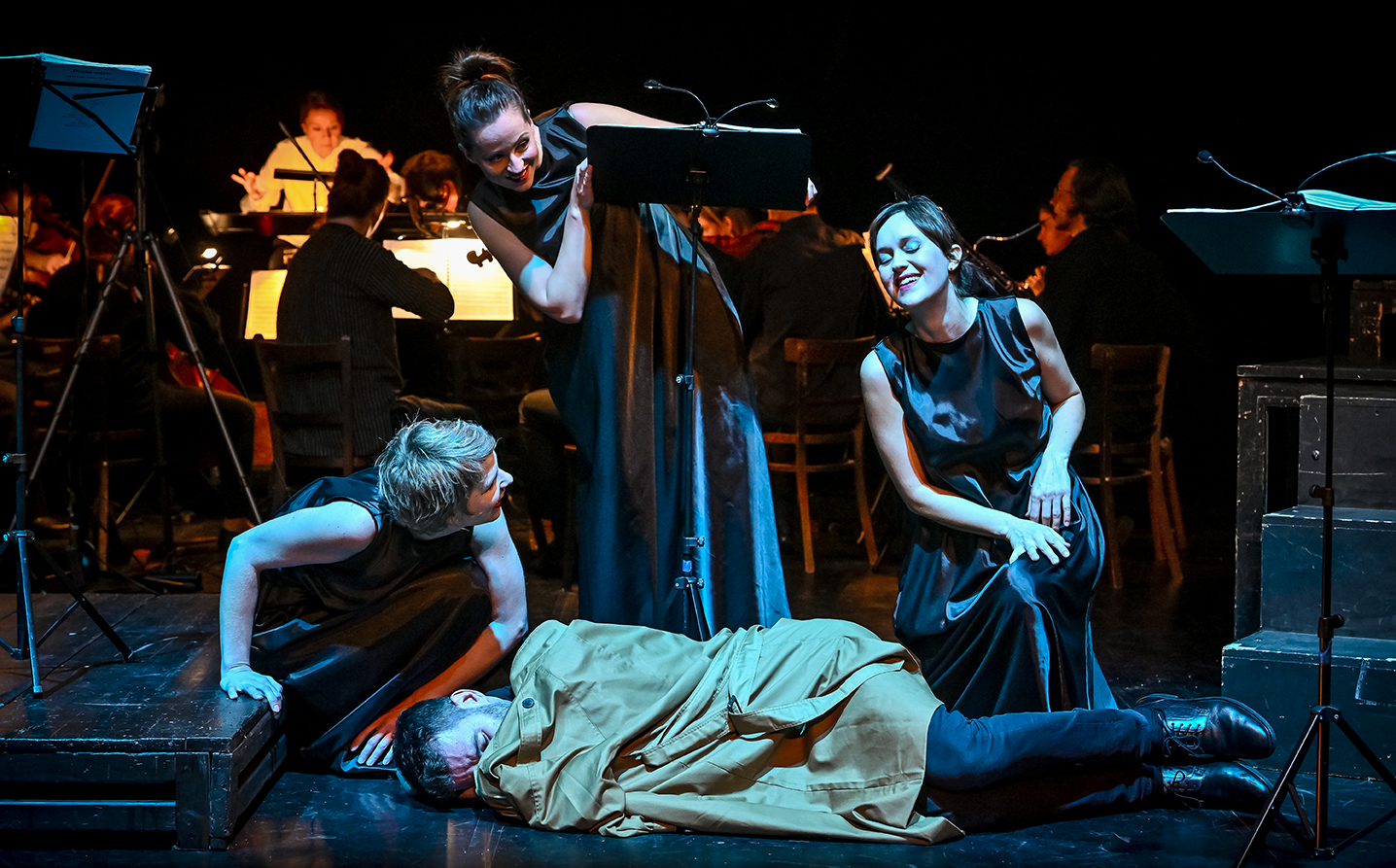
Photo Marek Olbrzymek
Neděle
9. března 2025, 19:30, Vzlet (Holandská
669/1, 101 00 Praha 10 – Vršovice)
ENSEMBLE DAMIAN
Jan
Josef Rösler: CANTANTA ON THE DEATH OF
MOZART
Jan
Branžovský: THE HOLOPRTY FESTIVITY
Stage director: Tomáš Hanzlík
KANTÁTA O MOZARTOVĚ SMRTI
Thálie – Markéta Israel Večeřová
Polyhymnia – Veronika Kaiserová
III. múza – Hana Solanská
IV. múza – Dorota Grossová
Petra Matějová – hammer
piano
Martin Smutný – organ positive
HOLOPRTSKÉ POSVÍCENÍ
Kuba – Matyáš Jirka
Franta – Martin Geržičák
Liduška – Kamila Škrachová
Reeve/Innkeeper– Radim Chmelík
Dorant – Arnau Petřivalský
Redvuta – Veronika
Adamová
Minka – Anežka Procházková
Watchman – Nil Petřivalský
The modern premiere of a
funeral composition from 1798 and a Czech singspiel from Třebechovice pod
Orebem.
Although these two compositions may initially seem vastly different in
theme, they surprisingly share many commonalities. Both musical works are preserved
uniquely in the archive of the Prague Conservatory, only in the form of piano
reductions. Both works are strongly connected to Mozart, with Rösler’s piece
linked thematically and stylistically, and Branžovský’s both stylistically and
through the transformation of Mozart’s music into a new form. For the Ensemble
Damian's production, the piano reductions were enriched by the accompaniment of
a chamber organ, based on the period practice of performing solo piano sonatas
with continuo. In the case of the Cantata,
this brings the sound closer to a sacred atmosphere, while in The Holoprty
Festivity it evokes the mechanical instruments from the late 18th and early
19th centuries.
The young Rösler was
employed as a conductor at the Estates Theatre from 1795, and it is likely that
the Cantata on Mozart’s Death was
performed there with local musicians, in a semi-staged memorial performance, at
the site of Mozart’s greatest triumphs. In the cantata, the muses – the
goddesses of creative inspiration – mourn the loss of the departed genius.
We have sadly little information
about the life and work of composer, translator, actor, dramaturge, and
passionate patriot Jan Branžovský (March 31, 1790, Třebechovice p. Orebem – ?).
He was the son of locksmith Jan and his wife Anna, née Vintrová. His younger
brother Václav (1801–1874) became a priest in Chotusice, and it is from his
estate that the surviving score of the singspiel Veselá bída comes. Jan Branžovský studied first in Prague, where he
was likely a vocalist. After his voice changed, he returned home and continued
his studies at the gymnasium in Hradec Králové (1807–1810) and in Litomyšl
(1811–1814). After 1814, he disappeared from records. According to reports
preserved in literature, he was an active figure in his hometown’s theatre
scene, the heart of Třebechovice’s amateur theatre. He played comic roles,
directed performances, translated and adapted texts, and composed arias, duets,
and choruses for every play. Only a few works survive: a singspiel based on the
Czech translation of E. Schikaneder’s Die
Lyranten oder das lustige Elend, the musical numbers for the singspiel Holoprtské posvícení (the author of the
text and year of origin are unknown), and the orchestral overture Rytíř Odalinský aneb Nevinná pomsta vraždy
(The Knight Odalinsky or The Innocent
Revenge of Murder) that was adapted for piano and chamber organ and became
the Sinfonia for the current production of Holoprty
Festivity. In the first twenty measures, Branžovský quotes a theme from
Mozart's Piano Sonata in C minor, KV 457, though in a major key, after which
the musical development is independent. The plot was reconstructed based on
clues found in the musical numbers, with the verse dialogues completed by Marek
Řihák. The music for two sections, where pages were torn from the manuscript,
was successfully reconstructed due to the periodic structure of the work.
Premiere:
June 2, 2024, Regional Museum in Olomouc
Approximate
running time 140 minutes, one intermission
In Czech
original.
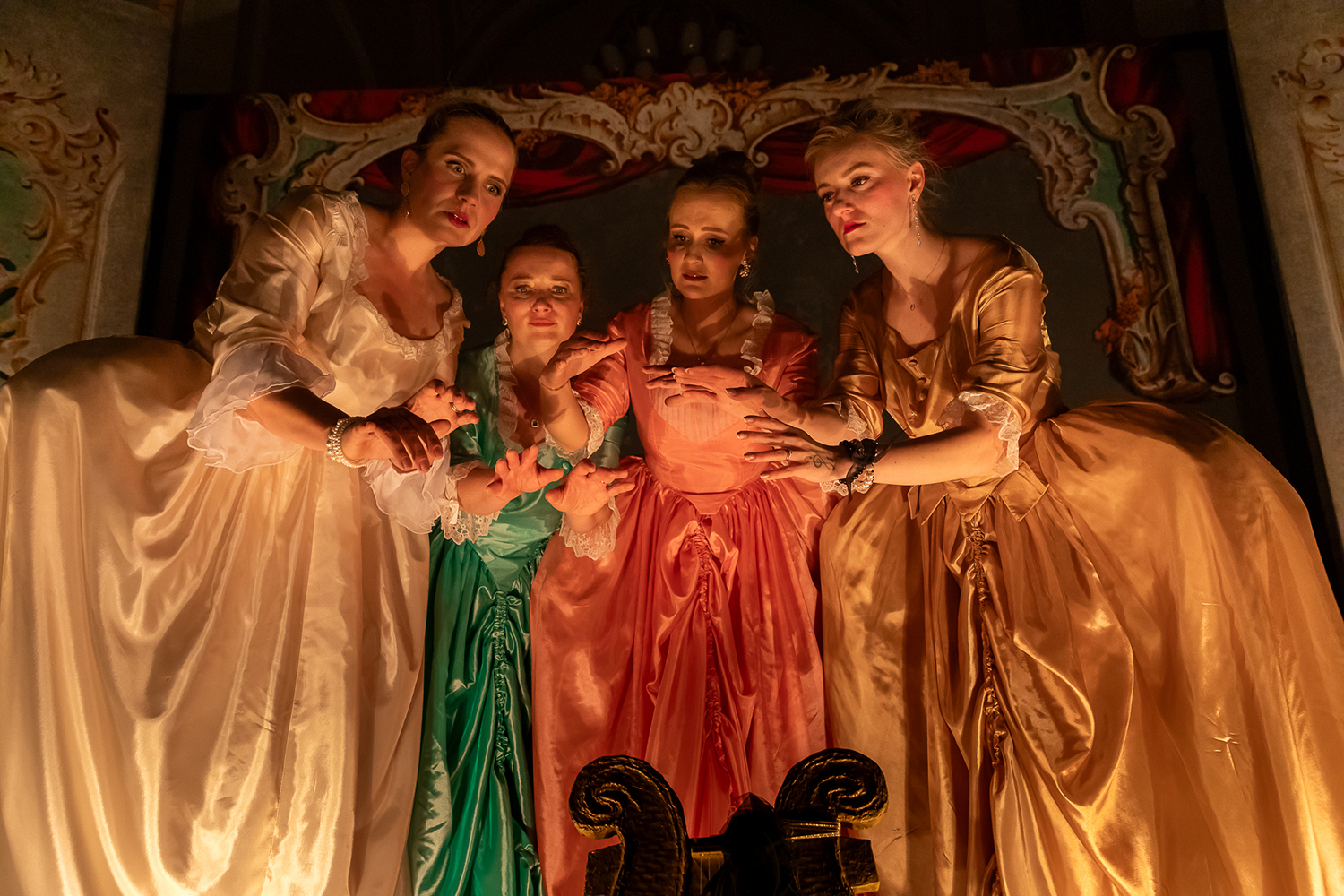
Photo Michal Málek
Neděle 16. března 2025, 19:30, Divadlo Komedie (Jungmannova 15/1, Praha 1)
OPERA STUDIO PRAHA
Joris Barcaroli: SGANARELLE ANEB DOMNĚLÝ PAROHÁČ
Dirigent: Sébastien Bagnoud
Režie: David
Bosh
Sganarelle – Jan Hájek
Jeho žena – Denisa Hanušovská
Célie, mladá žena – Linda
Kunclová
Lélie, mladý muž – Štěpán
Pokorný
Georgibus – Jan Kukal
Gros-René – Vojtěch Svoboda, pantomima
Villebrequin – Milena
Milanova, klaun
Spolupráce s Compagnie Panta
Představení v česko-francouzské spolupráci se společností Compagnie Pantai. Současný francouzský skladatel Joris Barcaroli vychází z francouzské hudební tradice a zhudebňuje Molièrovo dílo ve stylu operety. Opera studio Praha dílo uvádí dílo v češtině – jako základ je použit překlad Karla Čapka. Představení propojuje dvě různé školy pantomimy, jak se vyvíjela v Čechách a ve Francii. Ačkoliv je Francie kolébkou pantomimy, později je spojována spíše s klaunerií, proto francouzskou školu reprezentuje klaun. Českou školu nonverbálního divadla pak mim. Tyto dvě němé role společně provází příběhem, každá s důrazem na svou výrazovou jedinečnost.
Nastudováno v češtině
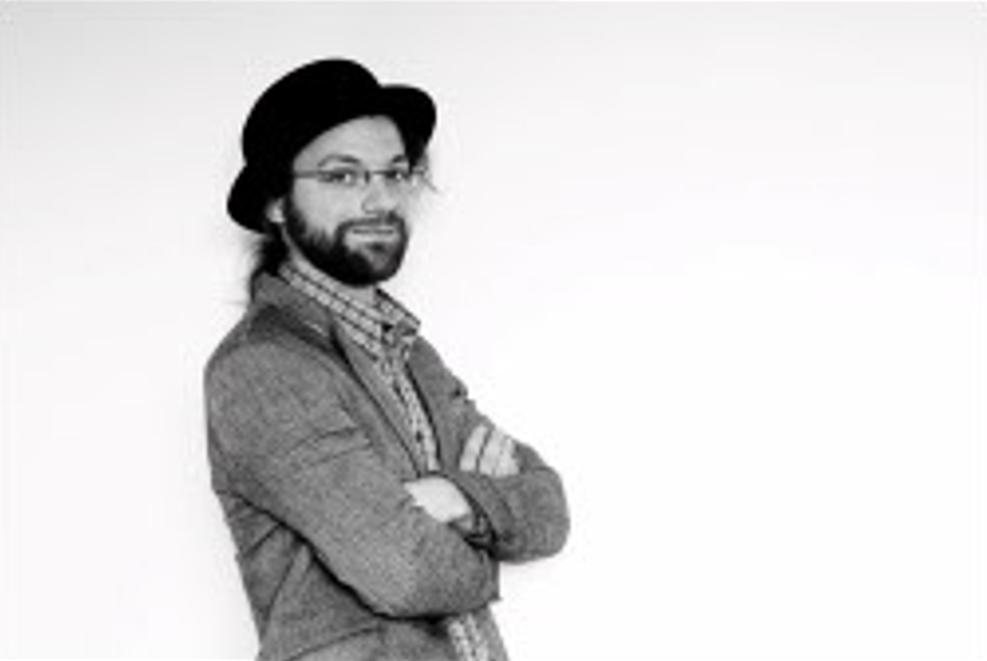
Photo Michal Málek
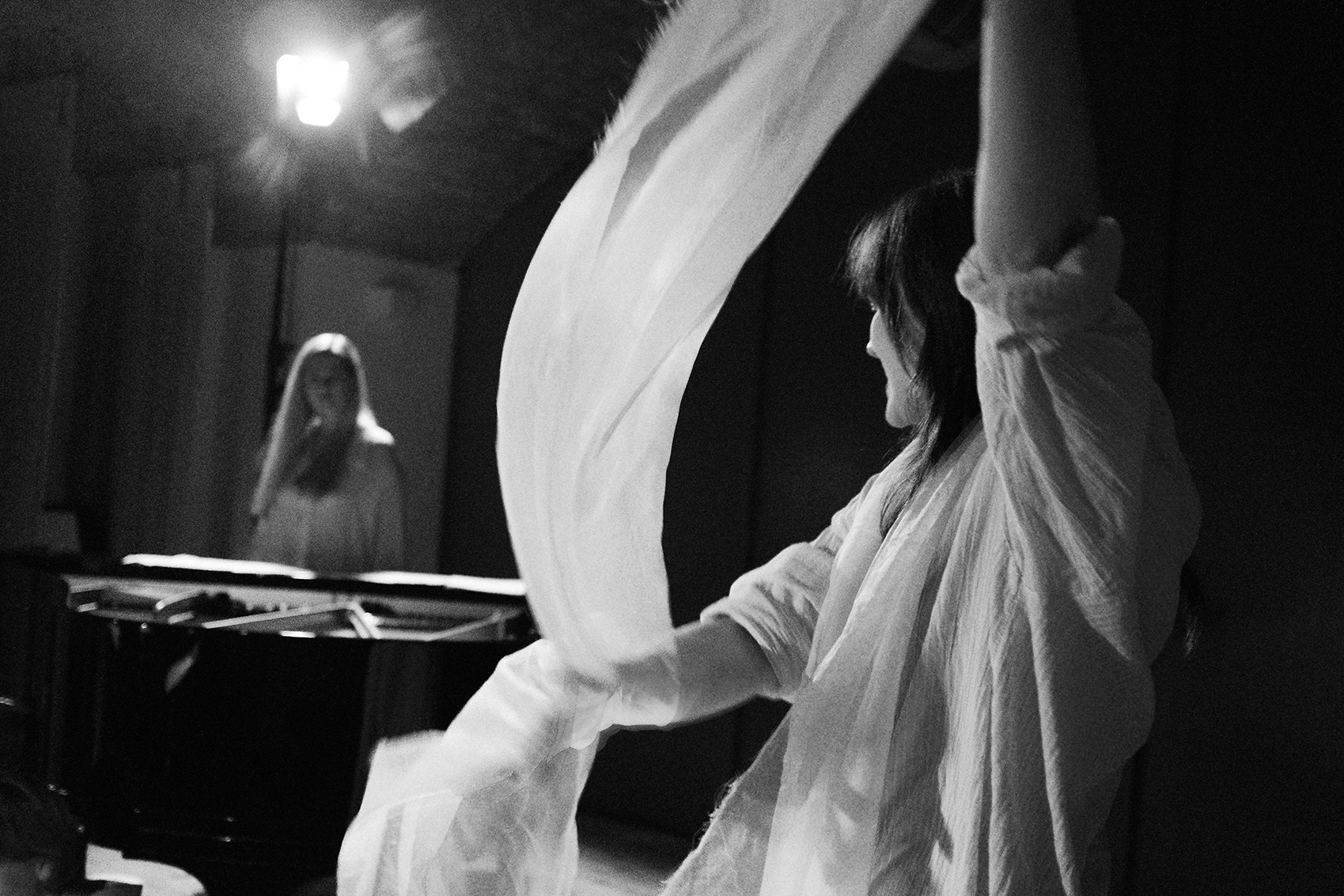
Friday, March 21, 2025, 7 p. m., The Villa
Winternitz (Na
Cihlářce 2092/10, Praha 5)
Kate
Soper: HERE BE SIRENS
Haimoni
Balgavá: ZVUKY DŽUNLE (SOUNDS OF JUNGLE)
Miloš
Orson Štědroň: OPILCOVO DÍTĚ ANEB MALÝ MSTITEL (THE DRUNKARD'S CHILD OR THE LITTLE AVENGER)
Experimental Musical-Theatre Composed Evening
HERE
BE SIRENS
Here Be Sirens is an opera/theatrical work by American
composer Kate Soper, blending beautiful music, terrifying noise, grotesque
comedy, and ancient tragedy. It portrays mythological sirens as real living
beings, preoccupied with their origins and obsessed with the possibility of
escaping their endless, monotonous desire. "Here Be Sirens" is a
phrase once used on medieval maps to mark unexplored waters, warning of unknown
dangers. It is also the title of the opera, where these creatures delve into
the complexities of their origin, desires, sorrows, and fears through the one
medium they master perfectly: song.
The opera is written for three sopranos and piano. The musical language
draws from various influences, including vocal polyphony, monophonic melody,
jazz harmony, and extended performance techniques. Harsh, raw music alternates
with ethereal textures, spoken passages, songs accompanied by piano, and a
cappella moments. The vocal parts in this opera are used melodically,
harmonically, percussively, and as a prepared instrument.
Sets and stage director: Zuzana Fischer
Starring: Aneta Podracká Bendová, Eva Marie Kořená, Jana
Vondrů
ZVUKY DŽUNGLE (SOUNDS OF JUNGLE)
The performance Sounds
of Jungle by the duo HANA and HAIMONI offers a musical interpretation
of Central American rainforests through the sounds of the flute, piano,
singing, and dramatic, physical staging. The cycle plays with the listener’s
imagination and uses improvisation, frequently shifting tonal colors and not
shying away from silence. But does silence exist in the jungle? Although the
piece employs extended instrumental techniques and may seem experimental in
description, its vivid imagery makes it easily comprehensible to the audience.
Haimoni Balgavá was awarded the international GENERATION 2021 prize for her Sounds of Jungle cycle (for flute and
orchestra), and the version for flute and piano, which you will hear at the
Opera festival, is a free continuation of that work
Starring:
Hana Hána – flute,
vocals
Haimoni Balgavá – piano
OPILCOVO DÍTĚ aneb Malý mstitel (THE DRUNKARD'S CHILD or The Little Avenger)
The mini-opera for three
characters and piano on a text by P. H. Cami was commissioned by the Teapot
publishing house on the occasion of the bibliophilic publication of a
collection of Cami's micro-comedies The Snail Tamer.
Libretto: Miloš Orson
Štědroň
Starring:
Poor mother – Veronika
Movsesyan
Disgraceful father –
Martin Vodrážka
Good kid – Tea
Štědroňová
Piano – Miloš Orson
Štědroň
Approximate
running time 110 minutes, one intermission
In English
(Here be Sirens) and Czech original
Photo Žaneta Havelková
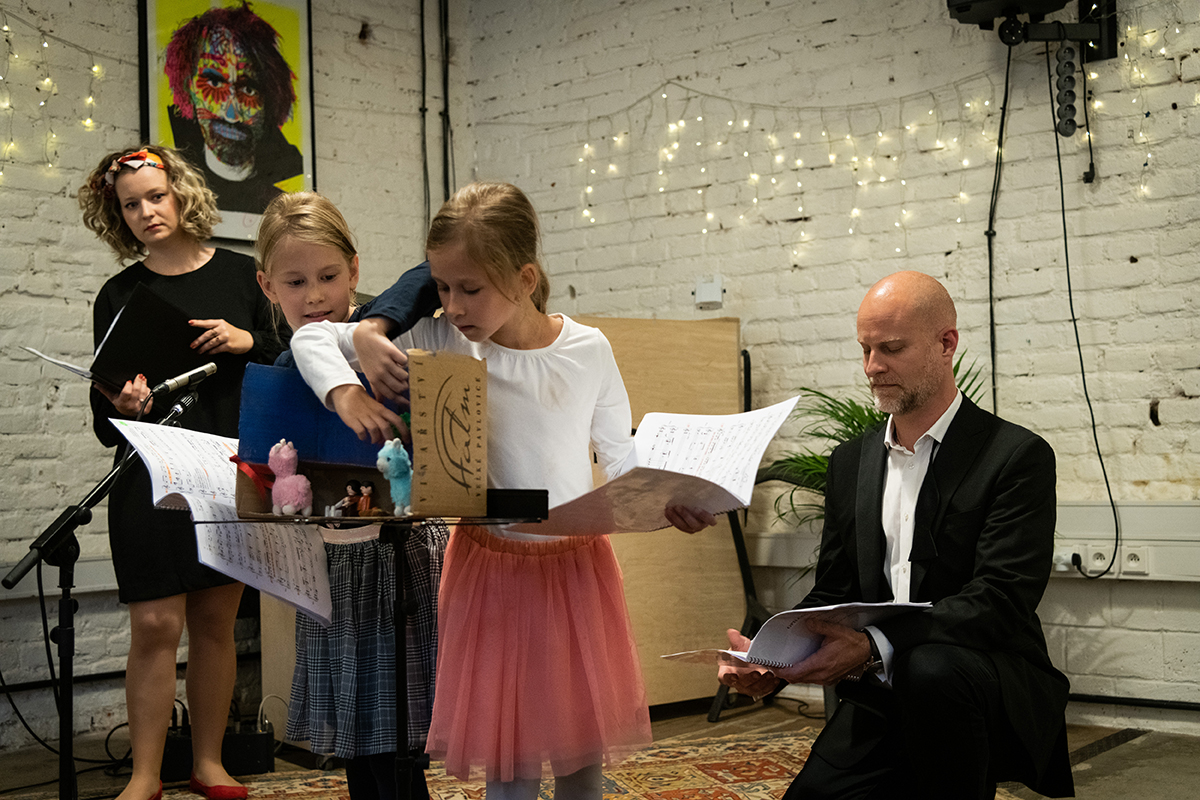
Foto Jan Rasch
Sunday, March 23, 2025, 3 p. m., Pražský Hlahol (Masarykovo
nábřeží 16, Praha 1)
OPERA LIDEM
Bedřich
Smetana: PRODANÁ NEVĚSTA (THE BARTERED BRIDE)
Stage director: Vladimír Chmelo
Music preparation: Ahmad Hedar, Vladimír Chmelo
Costumes: Roman Šolc
Acrobatic figures: Jurij Kolva
Piano: Ahmad Hedar
Clarinet: Aleš Hustoles / Tomáš Hustoles /
Tomáš Čistecký
Acrobatic figures: Taneční akrobacie Jurije Kolvy
Mařenka – Tereza Mátlová
Jeník – Peter Berger
Kecal – Daniel Hůlka
Vašek – Peter Malý
Krušina – Vladimír Chmelo
Krušinová – Markéta Dvořáková
Mícha – Petr Matuszek
Háta – Dagmar
Drechslerová
Esmeralda – Dana Šťastná
Principal – Matěj Doležal
Indian – Jiří Stejskal
Innkeeper – Petra Prýmková
Child – Rozárka Hůlková
Opera presented in a way
that audiences rarely experience: up close, within reach, and in an
unconventional setting. Featuring outstanding soloists and a carefully adapted,
intimate, and playful production.
Situated along the Vltava embankment, between the Dancing House and the
National Theatre, stands the Hlahol Society House, a stunning Art Nouveau
masterpiece by Josef Fanta, home to Alfons Mucha's final great work. It is here
that the Opera for the People ensemble stages the quintessential Czech opera,
Smetana’s The Bartered Bride, with
top Czech and Slovak singers. The production focuses on simplicity, tradition,
high artistic quality, and accessibility for a wide audience, from families
with children to seasoned opera lovers. This famous comic opera is presented in
a thoughtfully abridged version with spoken dialogue, accompanied by a chamber
ensemble of piano and two clarinets. The production highlights key aspects of
Czech character—humor, musical lyricism, and light-heartedness. With well-known
tunes like “Why Shouldn’t We Be Happy” and “I Know a Girl,” the audience is
drawn right into the heart of the opera.
In Czech
original
Premiere:
March 6, 2024
Approximate
running time 130 minutes, 1 intermission
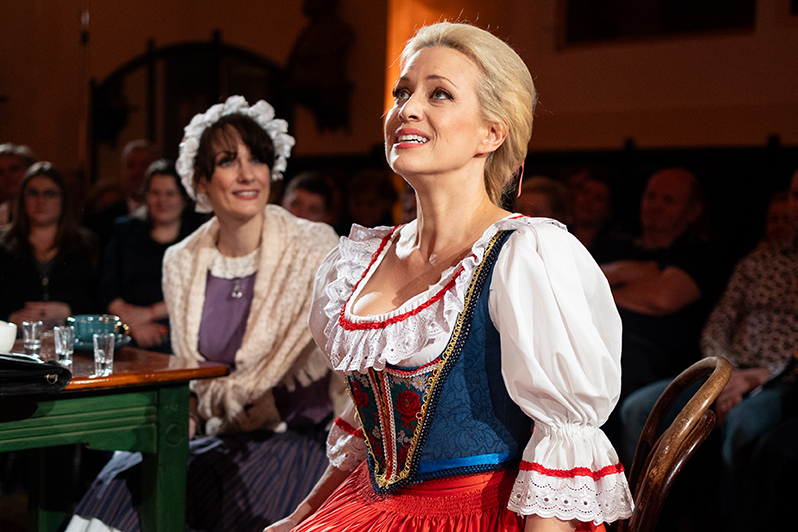
Photo archiv Opera lidem
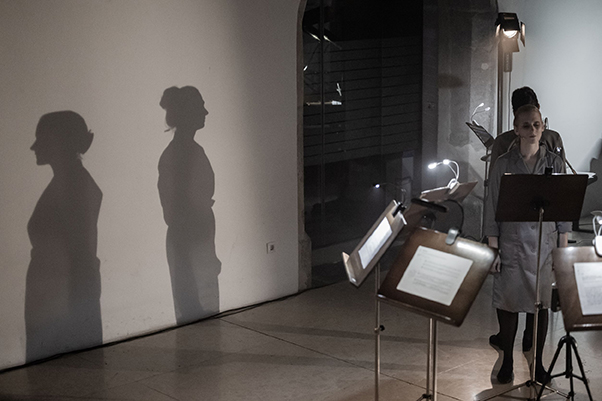
Saturday, March 29, 2025, 8 p. m., Studio Hrdinů
(Veletržní palác, Dukelských Hrdinů 7/530/47, Praha 7 -
Holešovice)
OPERATIVA
David
Ryan, Vít Zouhar, Rocc: I-ME
Concept, music, sound art, live performance: David Ryan, Vít Zouhar
Concept, production: Rocc
Starring
Katja
Konvalinka – vocals
Sanja
Nešković Peršin – performer
Jaroslav
Topinka – sound
Co-production
with the Slovenian Chamber Music Theatre
A research and experimental opera project that
seeks to explore new musical theatre forms and open the boundaries of what
opera can be.
The project takes as its
starting point the use of texts and words in the development of early operas of
the late Renaissance, whose librettos drew heavily on Ovid's Metamorphoses.
This is the fourth part of the free opera cycle ECHO-Metamorphoses that the
director Rocc launched in 2015 together with Vít Zouhar (Prague Quadrennial
2015) and on which Natalia Ushakova (Festival Opera Prague, 2017) and ISHA Trio
(Prague Quadrennial 2019) collaborated.
The complex history of early operas and their intellectual background in
attempts to modernize Greek drama according to historical principles remains a
fascinating puzzle for contemporary practice. The libretto itself, written in
various living, dead, and artificially constructed languages, draws on the
mythological theme of Echo and incorporates numerous epigrams from the famous Anthologia Graeca of the 7th century BC.
These epigrams offer us tremendous insight into the evolution of poetry and its
intertwining with memory and time. The literal translation of the word
"epigram" is "inscription," and these inscriptions serve as
prompts for travelers along the way. They are aphoristic statements about life
in general, reflecting on the human condition, meditations on loss, and
documenting desire and sexual whims, as well as playful uses of words and
concepts, but above all, the play of time itself.
The grand myths remain present throughout the anthology but are
confronted by the realities of everyday life. Today, they function as found
objects – topics that are often distant and off-putting, yet also strangely
close and present. Research into ancient music has surprisingly led to the
exploration of melody and the invention of simple scalar progressions. The
sound investigates the possibilities of something entirely elemental, thereby
opening up new acoustic, vocal, and spatial opportunities. The composition
contains a number of fragments that can be observed like a mosaic. I-ME reflects stories, events, and
destinies—what has happened cannot be forgotten as long as the inscriptions
remain legible. And when they are forgotten, they will still be present through
their absence. The inscriptions are boundary markers that delineate the
territories of thoughts, laws, beliefs, and actions. The I-ME project, therefore, is an echo of the unforgettable.
Premiere:
December 8, 2022, as part of Opera Schrattenbach Festival
Approximate
running time 60 minutes, no intermission
In English and Esperanto
Photo Darja Štravs Tisu
Saturday, April 5, 2025, 11 a.m., Municipal Library
of Prague (Mariánské
náměstí 98/1, Praha 1)
CHILDERN´S
OPERA PRAGUE
Jaroslav
Křička: TLUSTÝ PRADĚDEČEK A LOUPEŽNÍCI (THE FAT GREAT-GRANDFATHER AND THE ROBBERS)
Conductor and musical arrangement: Jan Šimůnek
Stage director: Jiřina Marková Krystlíková
Sets: Jiří Votruba
Costumes: Michaela Vernerová
Light design: Ivo Dankovič
Chorus master: Ondřej Kunovský
Soloists
and choir of Children’s Opera Prague
Orchestral
players of the National Theatre
It Turned Out Well or The Fat
Great-Grandfather, the Robbers and the Detectives is a two-act opera by
Jaroslav Křička, based on the fairy tale of the same name by Josef Čapek. The premiere took
place at the National Theatre in Prague on December 29, 1932, performed by its
drama company. For the Year of Czech Music, the Prague Children's Opera decided
to re-study this fairy tale.
A cheerful
story about a chubby great-grandfather who goes to sell a horse at the market
in Hradec and on his way back gets caught in a fierce storm in the forest. He
runs to take shelter in the nearby inn called "At the Golden Jug".
Unaware that a gang of robbers is having their ball there, he is first robbed
by them, but the great-grandfather outsmarts them with the help of constables
and Detective Sherlock Holmes. Thus, he can return home to his beloved great-grandmother
with a cheerful song, accompanied by his dog Voříšek.
Approximate
running time 60
minutes
In Czech
original
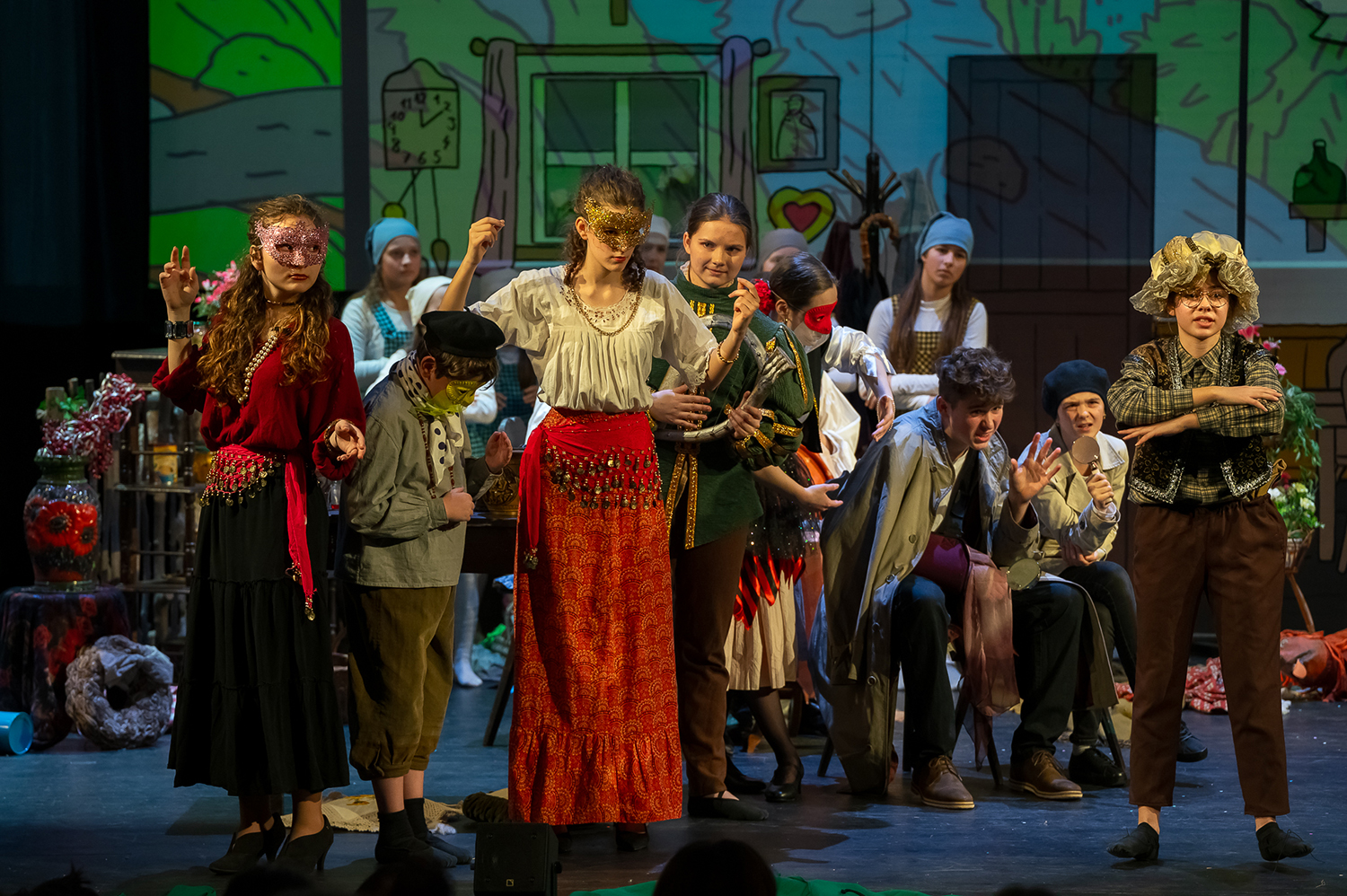
Photo Libor Galia
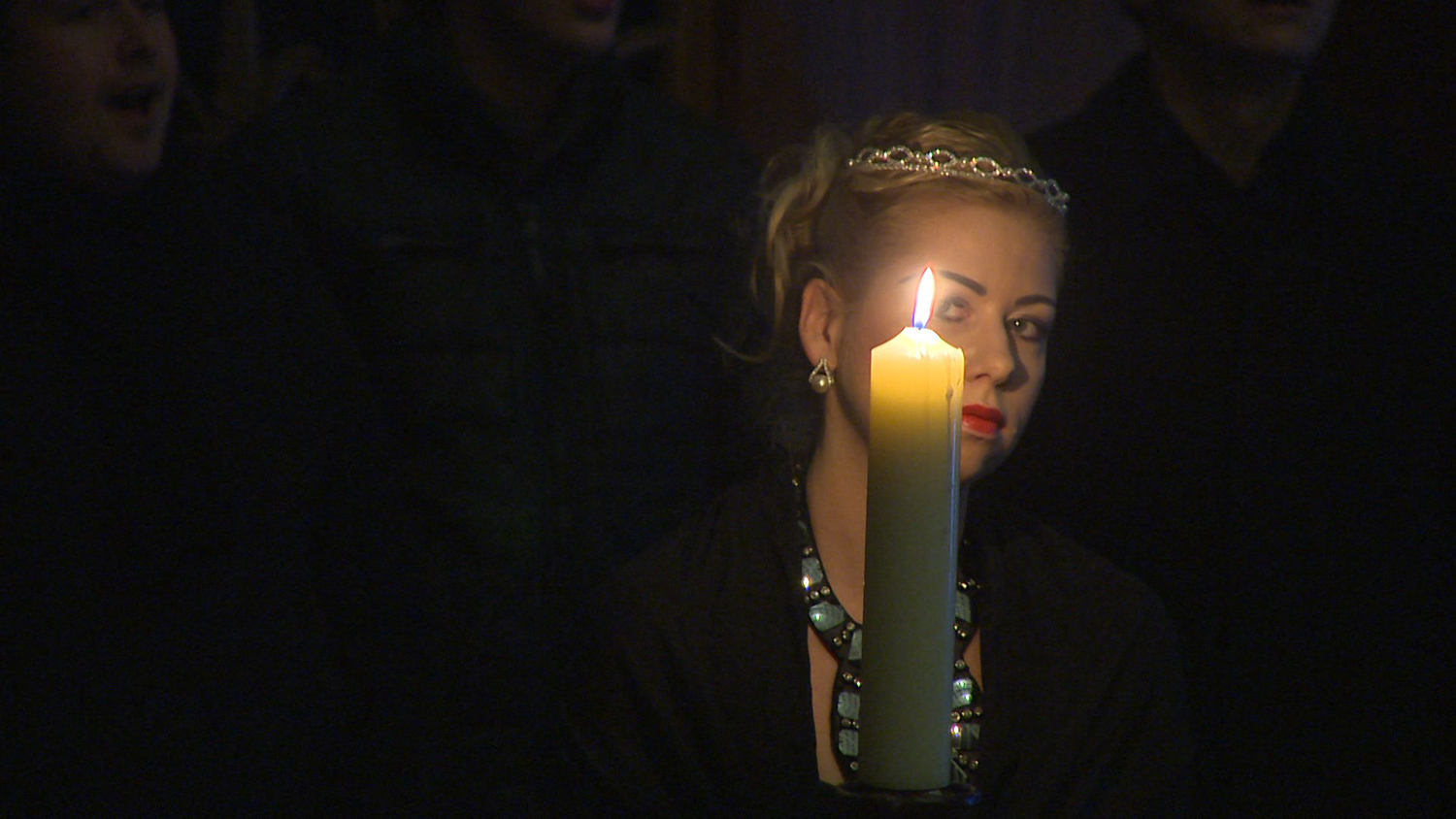
Sunday, April 6, 2025, 3 p. m., Church of the Hus Congregational House (Wuchterlova 523/5, Praha 6)
Emil
Viklický: ORÁČ Z ČECH
(THE PLOUGHMAN FROM BOHEMIA)
CANCEL
Libretto: Pavel
Dominik
Stage director: Rocc
Conductor: Ema Mikešková
Production: Kulturní Morava
Starringí:
Death – Michaela Zajmi
Ploughman – Aleš Briscein
The author of the music is one of the most important
Czech musicians Emil Viklický (1948), a jazz pianist and composer, a graduate
of the American Berklee College, playing and composing "across various
musical genres". He has garnered acclaim on Czech and international
stages, not only as a musician performing in leading jazz groups (alongside the
most prominent stars of the jazz music world), but also as a composer of
artistic music. Several of his larger music-dramatic works fall into this area
of creation. One of the most significant is the opera Der Ackermann aus Böhmen
(The Ploughman of Bohemia), based on the work of a German-language Czech author
known as Jan of Žatec. His work is one of the oldest and at the same time most
important literary creations written in the Czech cultural context and became a
link between the Czech and German-speaking inhabitants of the "Heart of
Europe".
Director's word: I perceive Emil Viklicky's opera
"The Ploughman of Bohemia" as a spiritual opera. Pavel Dominik's
libretto is based on the medieval disputation of Jan of Žatec from 1401, and
the very fact that it refers to a mind more than 600 years old and imbued with
an emerging humanism gives this musicalized "dialogue" an absolutely
timeless dimension. The ploughman, allegorically the prototype of a man trying
to come to terms with the death of his beloved wife, speaks to the personified
Death about the meaning of human life, and finally comes to the "divine
judgment" itself: the role of Death in life is weighty, it gives meaning
to life, and again, without life there would be no death either. What is
important in life are firm moral goals – and faith. But what are moral
principles nowadays and what is there to believe in? These are the questions to
which this piece leads us to. Even today we still try to avoid death, instead
of stopping in the hectic times, taking time to talk to it. That's how we learn
something, that's how we understand this beautiful life better.
Sunday, April 6. 2025, 7 p. m., Riding Hall Savarin (V Cípu 1, Praha 1)
LIEDER SOCIETY
SONGS OF LOST SOULS
Stage directors: Marie Anna Valíčková, Šimon Hrdlička
Piano: Vojtěch Červenka
Starring:
Tamara
Morozová – soprano
Bella Adamova
– mezzo-soprano
Monika
Jägerová – alt
Radek
Martinec – baritone
Co-production with RUN OPERUN
Site-specific Song Happening
Enter a world of the bizarre and eerie, where lost
souls come to life in the dark atmosphere of the 19th century. This unusual
happening will take you to an old cemetery created in the Savarin riding
school. Here, individual souls tell their tragic, sometimes grotesque stories.
Music by J. Brahms, F. Schubert, C. Schumann, F. Liszt, G. Mahler, A. Dvořák,
Z. Fibich, A. V. Horák. The band's dramaturgy draws on the fascination with the
aesthetics of darkness, ugliness and the supernatural that dominated artistic
circles at the time, and combines it with folklore full of terrifying and
mysterious motifs.
The audience is plunged into a world where melancholy
and terror are intertwined with a longing for redemption. Haunted figures and
ghosts are brought to life through music to find salvation at the end of the
evening. These strange stories are brought to life by the leading artists of
the young generation together with the participants of the Mladý salón (Young
Salon) concert education platform.
This bizarre musical-dramatic event will not leave you
cold – brace yourself for an evening of suspense, mystery and unexpected
emotions that will draw you into the world of the strange and unknown.
Opening night 4 November 2024.
Approximate running time 1 hour, no intermission

Photo Barka Fabiánová
Monday, April 7, 2024, 7 p. m., State
Opera
NATIONAL
THEATRE BRNO
Richard
Strauss: SALOME
Music preparation: Marko Ivanović
Conductors: Marko Ivanović, Ondrej Olos
Stage director: David Radok
Sets: Dragan Stojčevski
Costumes: Zuzana Ježková
Light design: Přemysl Janda
Choreography: Andrea Miltnerová
Dramaturgy: Patricie Částková
Herodes – Jaroslav Březina
Herodias – Eva Urbanová
Salome – Linda Ballová
Jochanaan – Tuomas Pursio
Narraboth – Vít Nosek
Nobleman Herodias – Jana Hrochová
1. Jew – Zbigniew Malak
2. Jew – Pavel Valenta
3. Jew – Petr Levíček
4. Jew – Michael Robotka
5. Jew – Kornél Mikecz
1. Nazarene – Josef Škarka
2. Nazarene – Pavel Valenta
1. soldier – Josef Škarka
2. soldier – David Nykl
Cappadocian – David Nykl
Slave woman – Jitka Zerhauová
Orchestra of the Janáček Opera of the National Theatre
Brno, Dancers
A girl is
dancing. One by one, as she moves sensuously, her seven veils fall to the
ground. She is dancing to please King Herod, and she wants only one thing for
it – the head of the man she loves. He has refused to reciprocate her love, and
Salome longs for at least a kiss from his dead mouth…
Expressive,
short and shocking – this is how Strauss's opera Salome, based on a play by Oscar Wilde, could be described in
brief. Inspired by the Bible story about the charming Salome, the daughter of
King Herod, and her obsessive love for the prophet Jochanaan, Salome provoked a real scandal
during the premiere. Thanks to its strong, dramatic music and rich orchestral colors, it became a worldwide sensation and has rightly remained
as such to this day.
Premiere:
June 17, 2023, at the Janáček Theatre in Brno
n German original, with
Czech, English and German subtitles
Approximate
running time 1 hour 45 minutes, no intermission
Suitable for ages 15 and
older
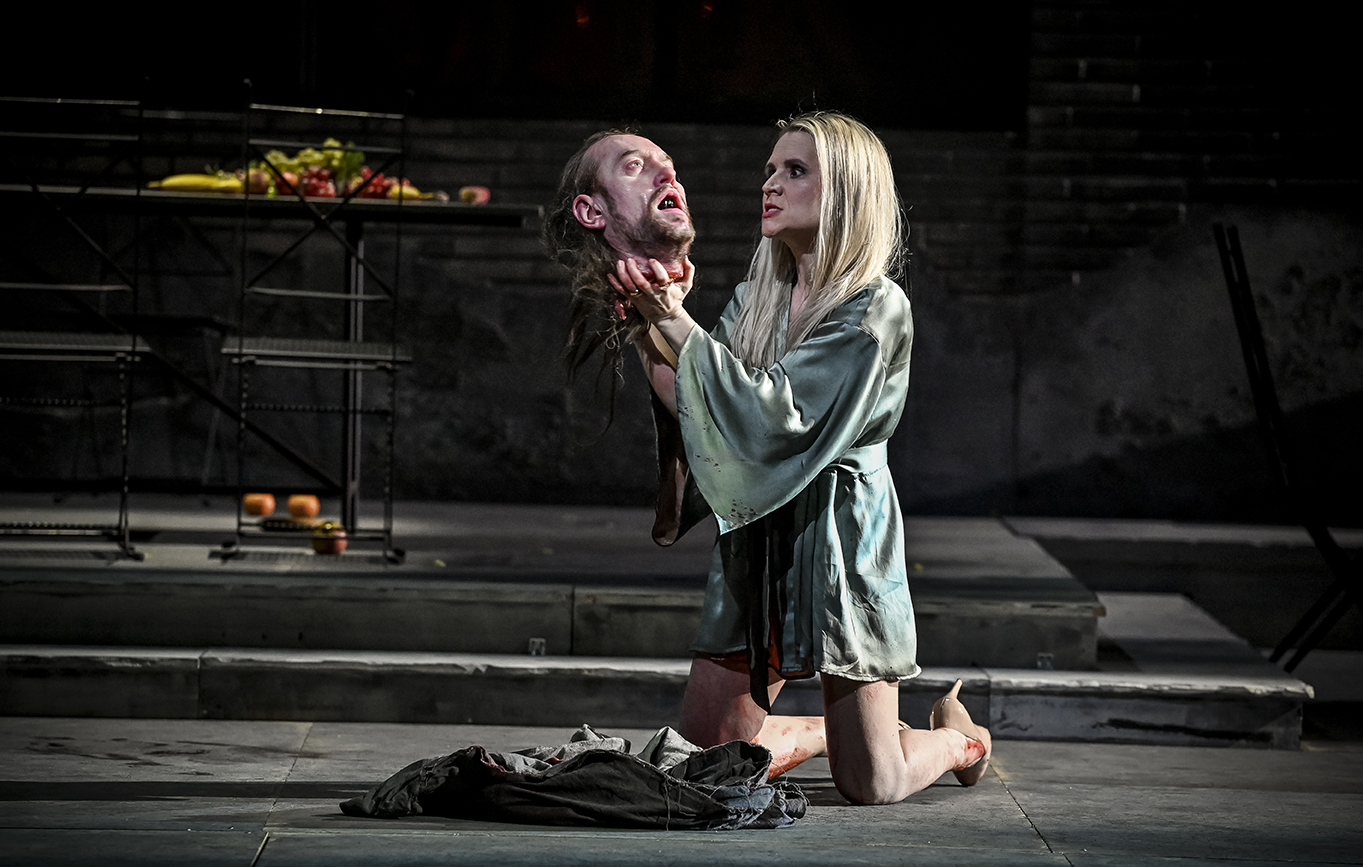
Photo Marek Olbrzymek
Wednesday, April 9, 2025, 7 p. m.,
State Opera
NATIONALÍ
THEATRE – STATE OPERA
Giacomo
Puccini: MANON LESCAUT
Conductor: Simone Di Felice
Stage director: Sláva Daubnerová
Sets: Alexandre Corazzola
Costumes: Tereza Kopecká
Light design: Daniel Tesař
Choreography: Jan Adam
Chorus master: Adolf Melichar
Dramaturgy: Jitka Slavíková
Manon Lescaut: Ghiulnara Raileanu
Lescaut: Lukáš Bařák
Renato des Grieux: Milen Božkov
Geronte di Ravoir: Jiří Sulženko
Edmondo: Martin Šrejma
Innkeeper / Sergeant of the archers: Ivo Hrachovec
Dance Master / Lamplighter: Josef Moravec
Musician: Michaela Zajmi
State Opera Chorus,
State Opera Orchestra, National Theatre Opera Ballet
A life
with the wealthy Geronte would offer the pretty Manon luxury, yet it would be
devoid of passion. And great passion is what Manon enjoys with the
poverty-stricken Chevalier Renato des Grieux. She must make a choice.
Failing to do so is fateful for her …
Premiere:
March 27, 2025, The State Opera
In Italian
original, with Czech and English subtitles

Monday, April 14, 2025, 7 p.m.,
Estates Theatre
MORAVIAN-SILESIAN
NATIONAL THEATRE (OSTRAVA)
Nino
Rota: Il capello di paglia di Firenze (The Florentine
Straw Hat)
Conductor: Marek Šedivý
Stage director: Jiří Nekvasil
Sets: David Bazika
Costumes: Zuzana Bambušek Krezková
Choreography,
Gagman: Števo Capko
Chorus Master: Jurij Galatenko
Dramaturgy: Juraj Bajús
Fadinard, a bridegroom: Martin Šrejma
Nonancourt, Elena's father: Martin Gurbaľ
Beaupertuis: Jiří Hájek
Vezinet, Elena's uncle: Josef Moravec
Emilio, an officer: Daniel Kfelíř
Felice, Fadinard's servant: Martin Javorský
Achille di Rosalba / A guardsmen: Rudolf Medňanský
A corporal of the guard: Ihor Maryshkin
Elena, Nonancourt's daughter: Veronika Rovná
Anaide, Beaupertuis' wife: Miroslava Časarová
A milliner: Marcela Gurbaľová
La Baronessa di Champigny: Anna Nitrová
A comic opera by a composer best known for his music in Federico
Fellini's films and The Godfather
trilogy. However, in the shadow of these Oscar-winning and other accolades,
Rota's remarkable body of work in symphonic, chamber, and music-dramatic
compositions is often overlooked. A striking example of his versatile musical
talent is the comic opera The Florentine
Straw Hat, with a libretto inspired by the famous farce by Eugène Labiche
and Marc Michel. This story gained extraordinary popularity in the Czech
Republic, particularly thanks to Oldřich Lipský's 1971 film adaptation starring
the brilliant Miloš Kopecký.
Set in mid-19th century Paris, the story draws viewers into a world of
absurd situations, mistaken identities, and uproarious humour. It follows
Fadinard’s chaotic and adventurous wedding day, after his horse eats the straw
hat of a stranger. His desperate attempt to replace the hat before the
situation turns into a scandal leads him through a series of increasingly
absurd escapades, encountering a colourful cast of characters along the way.
Rota’s music, filled with lively melodies, witty orchestration, and inventive
musical motifs that highlight the comedic elements of the plot, perfectly
complements the whimsical nature of the story. It’s a masterful blend of
Italian buffa, neoclassical style, playful energy, and the composer’s brilliant
sense of comedic timing. The Florentine
Straw Hat is one of the essential gems of 20th-century comic opera, and its
delightful music, timeless humour, and irrepressible joy of life now come to
you in its Czech premiere.
The Czech premiere: March 13, 2025, Antonín Dvořák Theatre
In Italian original, with Czech and English subtitles
Approximate running time 150 minutes, 1 intermission

Photo - Tereza Valnerová
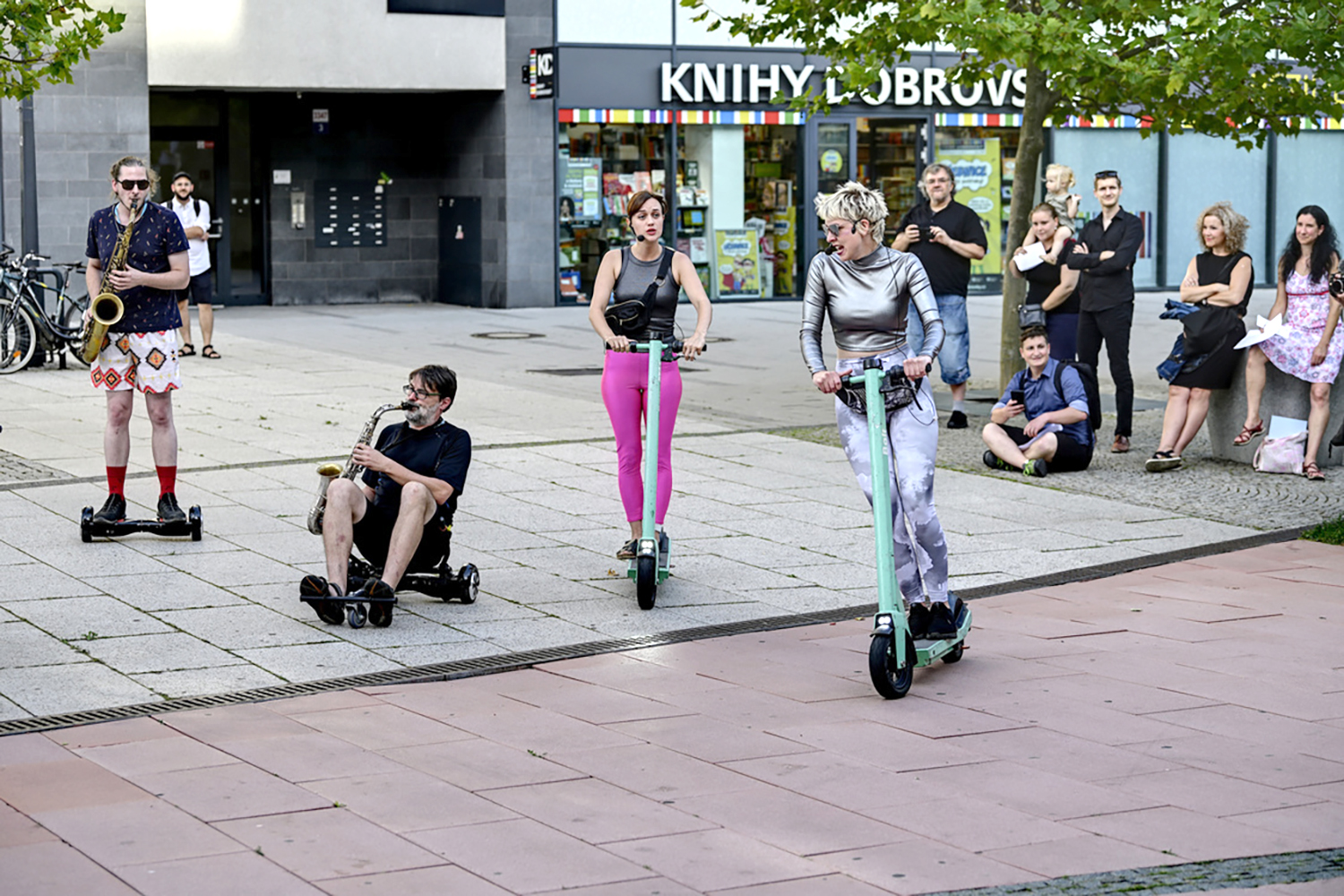
Photo Martin Popelář
Friday, April 18, 2025, 7 p. m.,
Estates Theatre
MORAVIAN
THEATRE OLOMOUC
Pietro
Mascagni: CAVALLERIA RUSTICANA
Ruggero
Leoncavallo: PAGLIACCI
Music preparation: Petr Šumník
Conductor: Marek Madeja / Petr Šumník
Stage director: Veronika Kos Loulová
Dramaturgy: Viktorie Vášová
Sets: Petr Vítek
Costumes: Vojtěch Hanyš
Light design: Jan Hugo Hejzlar
Choreography: Martin Talaga
Chorus master: Lubomíra Hellová
SEDLÁK KAVALÍR
Santuzza: Zuzana Jeřábková
Turiddu: Raman Hasymau
Lucia: Jitka Zerhauová
Alfio: Roman Vlkovič
Lola: Barbora Perná
KOMEDIANTI
Canio: José
Ansaldi
Nedda: Barbora Perná
Tonio: Minsoo Ahn
Beppe: Luis Carlos Hernándes Luque
Silvio: Daniel Kfelíř
Moravian Theatre
orchestra, chorus and ballet, Children's choir - BoDo centrum, o.s. under the
direction of Hana Vyroubalová
Cavalleria Rusticana is a story of love and
betrayal that ends in tragic death. The dramatic plot is supported by powerful
music, which amplifies every mood and emotion. In contrast, Pagliacci offers more thematic depth.
One of the key themes that became central to the production team is the life of artists and their role in society.
At the same time, a crucial element in Pagliacci
is the "play within a play" motif. Can we tell what is rehearsed and
what arises from improvisation? What is theatre and what is reality? What is intentional,
and what spins out of control?
Premiere:
December 15, 2023, Olomouc
In Italian
original, with Czech and English subtitles
Approximate
running time 3 hours, one intermission
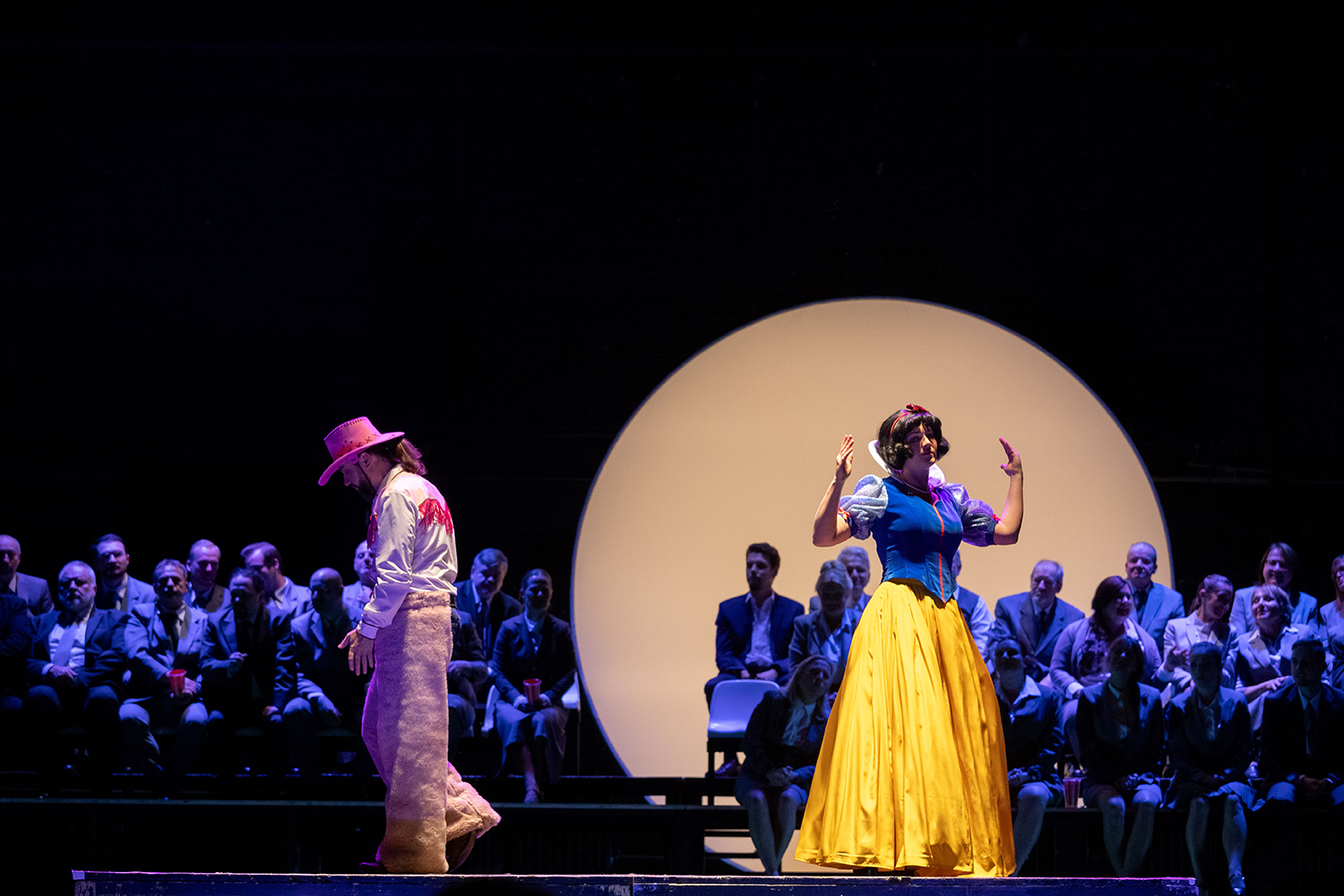
Photo - Tereza Valnerová
Monday, April 14, 2025, 3:00 p. m. /
4:30 p. m./ 6:15 p. m., 2025, Václav Havel Square
(National
Theatre piazzetta)
DUNAMI
ENSEMBLE
František Chaloupka: ROZLUČKA SE
SVOBODOU (STAG PARTY)
Mini-opera, concept: František Chaloupka and Tomáš Hlaváček
Sopranos: Jana Vondrů, Aneta Podracká Bendová
Saxophones: Antonín Mühlhansl, Radim
Hanousek, Pavel Zlámal, Pavel Šabacký
Keep moving forward, and preferably faster. Don’t stop.
Moving, yet not moving. Born in motion, attached to the battery of movement
from birth.
The apostles of techno-optimism, the priestesses of acceleration, celebrate
their lives on scooters, spreading unwavering faith in techno-optimism.
But from time to time, a crisis hits. One of the characters begins to be gnawed
by techno-skepticism and starts to slow down…
This street performance responds to current societal events, aiming to
bring the opera genre closer to passersby who might not usually engage with it.
In doing so, the audience becomes part of the performance, creating a unique
experience. Farewell to Freedom by
František Chaloupka explores the theme of voluntary loss of freedom due to
technological progress.
In Czech
original
Approximate
running time 12 minutes
Organizer
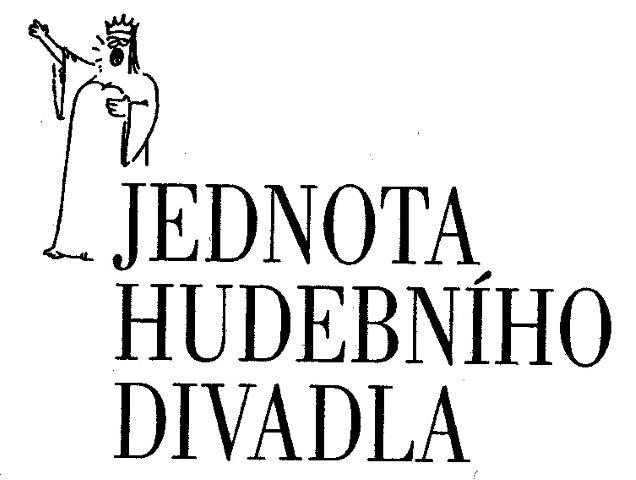
Main partner

Supported by
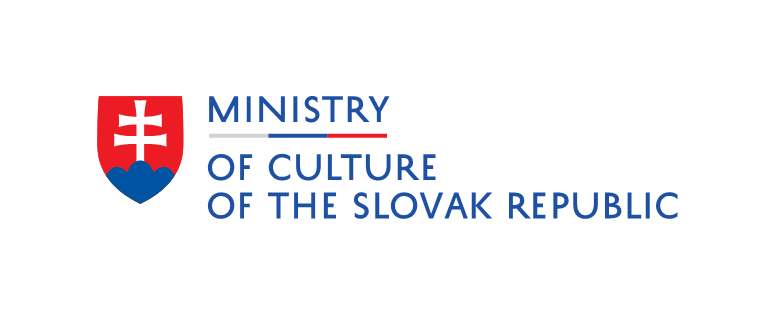
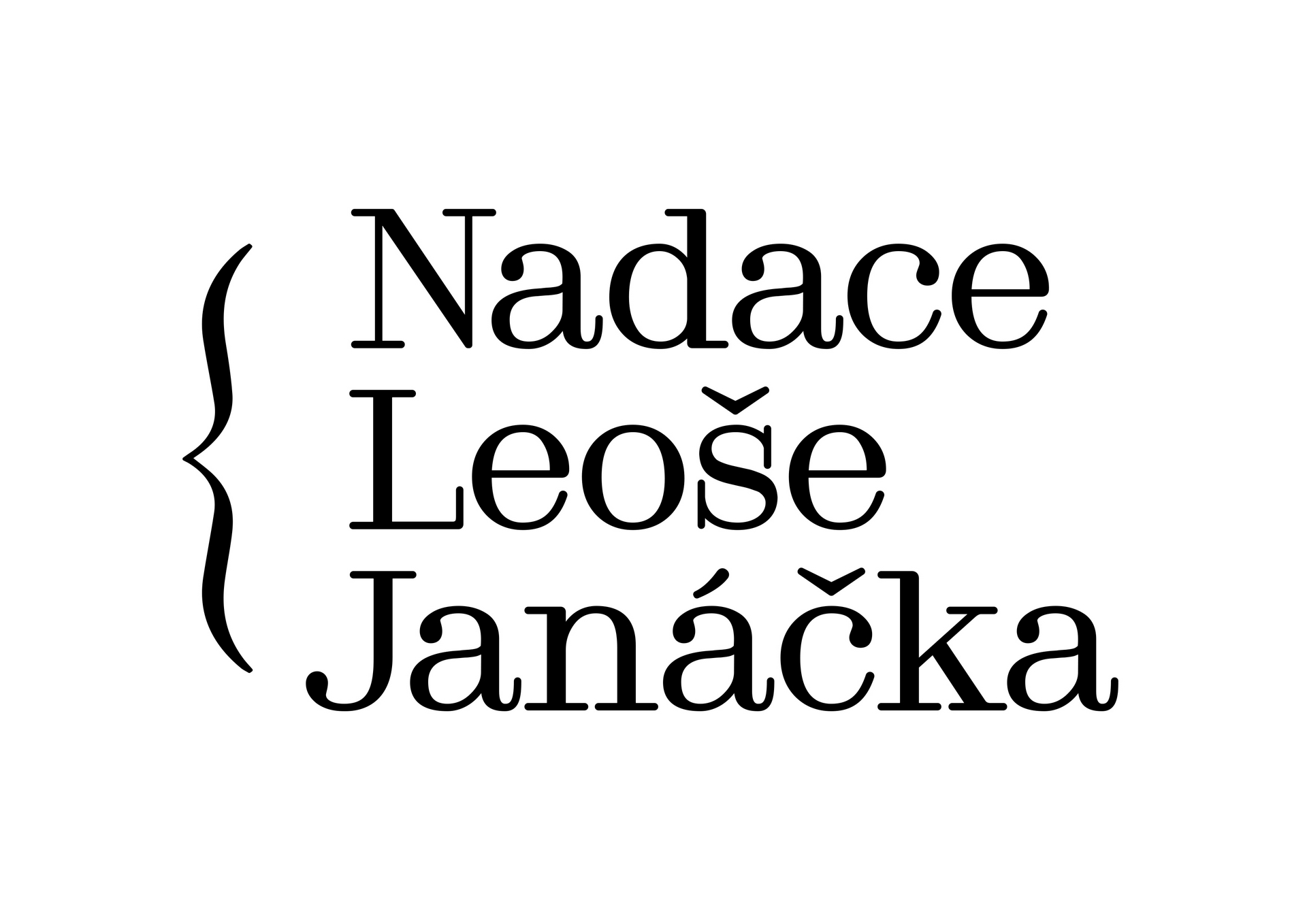
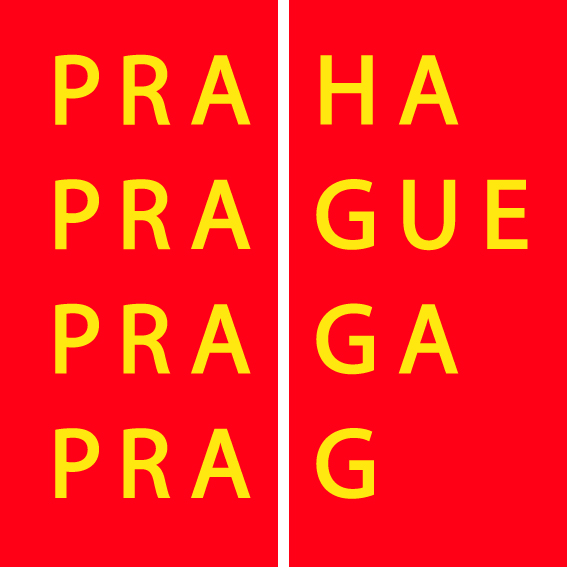

Main festival media partner

Festival media partners
Festival partners



This site was created with the Nicepage